A Backpacker's Guide to Paris Slang
Speak like a local with these 15 Parisian slang terms

Share with friends

- 14 September 2017
- • 6 min read
SPEAK LIKE A LOCAL WITH THESE 15 PARISIAN SLANG TERMS...
Sometimes travelling in a country where people don’t speak the same language as you can be difficult. It can be even worse when they start using slang! But don’t worry, we’ve summed up the top 15 most common slang words used in Paris to help you understand the youths of the French capital. Parisian slang is pretty different to other forms of slang spoken around France...so this may even be handy for some of you French residents planning a trip to the City of Lights...
Oklm, pronounced “Au calme” is used by young people to describe something that they are doing which is cool, calm and fresh. On Instragram, teenagers use the #oklm a lot when they are relaxing. Such as : “Une belle balade ce soir #oklm” meaning “A nice stroll this evening #chilled”.
CHIANT/E - RELOU:
Chiant (for males) and chiante ( for females) means annoying in English. Relou, another word with the same meaning is also used a lot in French slang. “Relou” comes from the word “Lourd” meaning heavy, as in hard to handle.
These words are used as criticism towards someone. For instance, “T’es relou!”, “T’es chiant(e)!” means “You’re so annoying!”
LAISSE TOMBER:
This expression is a very well known French expression applied when someone doesn’t understand something that you've repeated a numerous amount of times. Then, you can say : “Laisse tomber, c’est pas grave!”
“Don’t worry about it, it’s not important!”. It can also be used when you want to stop an argument “ Laisse tomber l’affaire” as in "let it go”’.
AVOIR LE SEUM:
This is an expression used when you are unhappy about something. Again, this sentence is mainly used by a younger generation. If you’re talking to an elder person they will probably have no idea what you’re talking about!
You can use this phrase when talking about something unfortunate that happened to you. For example, say you’re favourite football team lost a match, you can say “J’ai trop le seum , parce que mon équipe de foot a perdu le match hier soir.”
“ Wesh” is a word that originally came from the rappers who lived in the suburbs in Paris. It’s used when greeting someone, usually family and friends.
Nowadays, BG is very popular. It stands for “ beau gosse” ( when talking about a male) and “belle gosse” ( when talking about a female) meaning that the person you’re talking about is good looking .
Keep in mind that Gosse on its own is slang for a child so make sure you add “beau” in front otherwise you will be telling someone they are a child rather than good looking. Awkkwaaard.
Photo credit: Jayantraj Bhagyawant | @the_travelluster
Bobo is used to talk about an injury . French people usually use this word when talking to younger children and referring to minor injuries such as cuts and bruises.
It is also used when trying to joke around with someone, such as, “Oh, t’as un bobo?” when someone has a very small injury but acts like they are seriously hurt.
The word “Bouffer” is used a lot in France. Many French people have used this word replacing the word “manger” meaning to eat. Although, “Bouffer” is a word which is used a lot, it isn’t very elegant, therefore, if you’re in a very smart restaurant in Paris, I would recommend sticking to the word “Manger” otherwise you might risk receiving some weird looks!
In France, “Clope” is the slang word for Cigarette, like Ciggy or fag in English. If someone says to you “T’as une clope?” it means they are asking you for a cigarette. You can also use that sentence if you want to ask someone for a cigarette .
“Kiffer” is a slang way of saying that you adore something. The synonym for this word used in English would be “dope”. You can use this word when describing a human, an object, a place, a hobby or even when you’re talking about food!
For example, “Je kiffe le chocolat”, “Je kiffe ton style” meaning “I adore chocolate” and “Your style is dope”.
Be careful though because if you say “ Je te kiffes” it means that you fancy the person you are saying it to!
So, if you hear someone say this to you, don’t threat! It’s a good sign!
Similar to “Chick” and “Dude” in English, “Meuf” and “Mec” are slang words used to describe a girl and boy. “Meuf” being feminine and “Mec” being masculine. People also refer to their girlfriend or boyfriend using these slang words, for instance, “Mon mec” and “Ma meuf”. However, some people use these slang words in a negative way, for example, “Regarde cette meuf” which means “Look at that chick” can be meant in a negative way.
If you hear someone in the street scream “C’est ouf” this can be both a good or bad thing. The meaning of the word “Ouf” is when someone is relieved about something, like “Phew” in English. However, the slang word “Ouf” means that something is crazy! Such as : “Regarde le bâtiment, il est ouf!” meaning that the building is awesome, or, “T’es ouf” which means “you’re crazy” which can be considered more pessimistic.
Another common word used by a younger generation is “Bolos” - and it can be used in different ways. Similar to the word “lame”, "jerk" or "moron" in English, this word is used as an insult towards a person. For example, if someone was blasting their music so loud that you could hear it all night, one would say “T’es un bolos” meaning in English “You’re lame”.
“Baraque” is a slang way of using saying “House”. A similar English word could be “crib”. Say you’re having a drink in a bar and you meet someone and get chatting and they say “Tu veux voir ma baraque?”, it means they are inviting you back to their place!
In France, this word is mostly used when describing a mess, usually someone’s room. “C’est le bordel dans ta chambre” : “You’re room is a mess!”
However, it can also be used when something has happened, say, for example, you had a wild night out, you can say : “C’etait le bordel hier!’ : “Last night was crazy!”
Liked this article? Share with friends
Read all Travel Blogs
- Skip to primary navigation
- Skip to main content
- Skip to primary sidebar
- Skip to footer
StoryLearning
Learn A Language Through Stories
23 French Slang Words to Impress the Locals On Your Next Trip to France
Today I'm delighted to feature a guest post that explains 23 of the most useful French slang words that will help you speak with confidence during your next trip to France.
Sounding natural when you speak is a tricky task but if you can use some of the colloquial French phrases in this post, you'll impress the locals and sound a lot more authentic right away.
In this post, you'll learn about slang words in French and what each word or expression means. You'll also see an example of how to use it in a sentence.
I think you’re going to really enjoy trying out some of these words and phrases yourself.
Over to Jade…
It might seem like a far distant dream but it’s possible.
The best way to make your language learning peers jealous and impress the locals is to cheat. And by cheating, I mean quickly learning some French slang words that will make you sound like a local when it comes time to open your mouth and speak.
23 French Slang Words To Add To Your Vocabulary
French is a language that isn’t technically too difficult to learn .
And if you want to sound just like you were brought up in the streets of Paris or Québec then you should start by learning some of these 23 French slang terms.
By the way, if you want to learn French through stories, not rules, my top recommendation for language learners is my Uncovered courses, which teach you through StoryLearning®. Click here to find out more and try out the method for free.
Bouffer is a colloquial verb meaning “to eat”.
It literally means to “puff up” or “blow up” in size however it’s common to hear it being used in everyday speech meaning “to eat”.
This led to the introduction of the noun la bouffe which means food.
- J’ai bouffé à la cantine ce midi. (I ate at the cafeteria at lunch time).
This is the trendiest new word used by French-speaking millennials everywhere.
Kiffer is based on kif , originating from the Arabic word ‘hashish’ or cannabis. The modern French slang meaning is to take pleasure in, to be attracted to or to like something.
The association comes from the heightened sensations from this narcotic.
It was introduced by younger generations of Arabic immigrants and found its way across popular cities and now even holds a place in the dictionary.
- Je te kiffe ! (I like you)
- Tu vas trop kiffer ! (You will like it!)
3. Faire Gaffe
I love this common French slang phrase because it actually means the opposite of its literal translation which is “to make a mistake”. This expression actually means watch out or be careful!
- Ça peut être dangereux – fais gaffe ! (That can be dangerous – be careful!)
4. Une Bagnole
This is a kind of “hipster” way to say “car”.
Surprisingly there are many ways to say “car” in French, including:
With all this choice it makes the English language seem a bit dull in comparison!
- Ah c’est une belle bagnole ! (It’s a beautiful car!)
Nickel is the name of a metal in English, a material known for its smooth and shiny surface. The French took a shining to this word and adopted it into their own language using it to mean “spotless” or “impeccable”.
- Range ta chambre, je veux qu’elle soit nickel ! (Clean your room, I want it to be perfectly clean!)
What does sympa mean? Sympa is an abbreviation of sympathique meaning that something or someone is nice or friendly. The French tend to abbreviate many adjectives to give them a cool edge.
- J'habite un quartier sympa. (I live in a nice area).
Balle would literally translate as “bullet” in its singular form.
In the days before the Euro become the official currency, the French created this slang word to refer to their old currency: the French Franc .
But when the Euro was introduced the word balles seemed to stick around.
- J’aime ton pantalon.- Merci. Je l’ai acheté au marché pour quinze balles. (I like your trousers – Thanks, I bought them at the market for 15 quid).
8. Envoyer Du Pâté
Envoyer means to send and pâté describes a spreadable meat paste, a word that we have borrowed and continue to use in the English language.
For some crazy reason, this French slang expression means something is “awesome” and is commonly used by teenagers and students.
- Ça envoie du pâté ! (It’s awesome!)
9. C’est Trop Bien
Trop is often used to say something is more than très (very). It means something like “so” or “too much”. It's often used to exaggerate how great something is.
- C’est trop bien que tu sois venu ! (It’s so cool you came by!)
10. C’est Chouette
The word chouette is used to talk about something that's pleasing. It’s usually used to describe a person, an object or an event. This French slang expression is only used in a sincere and genuine way.
- Je trouve cette couleur très chouette. (I find this colour very nice).
The word mec is used for guy in a laid back kind of way just like “dude” or “mate” in English. But it also refers to boyfriend.
To be honest it’s so widely used now that it can hardly be described as cool French slang as you’d probably overhear a bank manager or your teacher saying it.
- Tu viens avec ton mec ? (Are you bringing your boyfriend?)
12. Une Arnaque
This word basically means something is “a rip off” or a “scam”. It’s great Paris slang to use if you are in the centre of the tourist spots in Paris!
- Cette annonce est une arnaque. (This advertisement is a scam.)
13. Sans Déc
Sans déc means “no kidding”, “no way” or “get out of here!” The French slang translation is far stronger than in English though.
It’s short for sans déconner. The French often shorten certain words which instantly makes them cool and hipster.
It’s considered by many as French vulgar slang, so you’d best use this phrase in casual situations only.
- Il a sauté d’un immeuble de trois étages et s’est relevé sans une égratignure. Sans déc ! (He jumped from the 3rd floor of a building and stood up without a scratch. No kidding!)
14. Ça Roule
The literal translation would convert to “that’s rolling” in English. But in French, it means “that’s great”, “that works for me” or “I’m happy with that”.
If you really want to sound cool then you can say Ça roule ma poule , a little French slang rhyme that basically means “no worries, honey”.
Among French colloquial expressions, this is definitely a favourite of mine!
- On se retrouve dans le centre à midi ? – Ca roule ! (Let’s meet up in the centre at noon. – Okay!/That works for me!)
15. Le Pinard
We all know the French can be wine snobs (and quite rightly so!).
The word pinard refers to a really cheap and awful-tasting wine. The French argot term was apparently introduced in the early 1900s when soldiers used to drink a horrible wine that was branded as Pinard..
- C’est quoi ce pinard ? (What is this [terrible] wine?)
16. Tranquille
Tranquille is an adjective to describe something relaxing or calm.
However, if you hear used as French modern slang in the streets of France in means something like “sure, no probs”.
- T’as réussi ton exam ? – Tranquille (Did you pass your exam? – Yeah, easy/no problem!)
This is a very common French slang word that probably doesn’t technically count as slang anymore due to its popularity.
Quoi translates to English as “what”. Recently French speakers have taken to adding quoi to the end of their sentences to add a certain level of emphasis.
The good news is that you can add it to any sentence without sounding wrong so there's no fear of failure! It’s probably the easiest of the slang words in French to test out among your French peers.
- Il n’avait pas de plan de la ville. Son téléphone n’avait plus de batterie. Il avait oublié le nom de la personne qu’il devait retrouver… Pas de chance, quoi. (He didn’t have a map of the city. His phone was out of battery. He had forgotten the name of the person he was supposed to meet… Tough luck).
This is an informal way of using the verb travailler or “to work” as we would say in English.
It’s pronounced “buh-say”.
The next time you are having a hectic week try saying something like this …
- Je bosse comme un(e) taré(e). – I’m working like a crazy person.
19. La Vache !
Une vache is literally a cow but in modern French slang it means “oh my god”.
As you can imagine, French youngsters use it a lot.
In a way, it’s not far off the American expression “holy cow” which you might have heard Bart Simpson fondly use if you tuned into The Simpsons back in the nineties.
- La Vache ! Tu m’as fait peur ! (Oh my god! You startled me!)
20. Laisse Tomber
This expression means “let it go”. It’s used in a “drop it” or “never mind” sort of way.
Some would say it’s slightly more aggressive than its English equivalent so it’s one of those French slang phrases you probably don’t want to use around people you’re not too cosy with.
It’s actually a great phrase to use talk about learning a language when you can easily tie yourself up it knots trying to explain a simple concept.
- Laisse tomber, c’est pas grave ! (Just forget it, it doesn’t matter!)
This is a phonetic acronym for the phrase au calme , which literally translates to “being quiet”.
More recently, however, it would mean something is calm, chill, or cool in French slag. French rapper Booba introduced it and it took off from there.
This French text slang also makes for a great hashtag, so you’ll see it on French Instagram or Twitter posts all the time.
- Une belle balade ce soir #oklm (A nice stroll this evening #chilled)
22. T’sais?
This very casual phrase has become so common that it’s hard to imagine life before T’sais .
It means “you know” or “do you know what I mean” and it's something you would add on at the end of your sentence.
English speakers can definitely relate to this one, as we use something quite similar.
- Non, mais j’en ai marre, t’sais ? (No, but I’m sick of it, you know?)
23. Allez Savoir Pourquoi
To end this list of French slang words, I’ve chosen allez saviour pourquoi because it loosely translates as “God knows why” or “for whatever reason”.
It's used to describe a situation you have absolutely no idea about and it’s one of those French slang expressions that makes you sound really authentic when you speak French.
- Allez savoir pourquoi j'ai choisi cette dernière expression (God knows why I’ve chosen this as the last expression).
What Are Your Favourite Slang Words in French?
Well there you have it, twenty-three wonderfully delightful informal French slang words and phrases that you can use to impress the natives and gain level points up on your language skills.
Bookmark this mini French slang dictionary so you can come back to it.
Now it's up to you to go out and try a few slang words in French the next time you speak to someone in French . Bonne chance!
This article was brought to you by Jade at Matinée Multilingual: Voice over agency . Jade is a lover of travelling, blueberry muffins and Instagram.
Language Courses
- Language Blog
- Testimonials
- Meet Our Team
- Media & Press
Download this article as a FREE PDF ?
What is your current level in Swedish?
Perfect! You’ve now got access to my most effective [level] Swedish tips…
Where shall I send the tips and your PDF?
We will protect your data in accordance with our data policy.
What is your current level in Danish?
Perfect! You’ve now got access to my most effective [level] Danish tips…
NOT INTERESTED?
What can we do better? If I could make something to help you right now, w hat would it be?
Which language are you learning?
What is your current level in [language] ?
Perfect! You’ve now got access to my most effective [level] [language] tips, PLUS your free StoryLearning Kit…
Where shall I send them?
Download this article as a FREE PDF?
Great! Where shall I send my best online teaching tips and your PDF?
Download this article as a FREE PDF ?
What is your current level in Arabic?
Perfect! You’ve now got access to my most effective [level] Arabic tips…
FREE StoryLearning Kit!
Join my email newsletter and get FREE access to your StoryLearning Kit — discover how to learn languages through the power of story!
Download a FREE Story in Japanese!
Enter your email address below to get a FREE short story in Japanese and start learning Japanese quickly and naturally with my StoryLearning® method!
What is your current level in Japanese?
Perfect! You’ve now got access to the Japanese StoryLearning® Pack …
Where shall I send your download link?
Download Your FREE Natural Japanese Grammar Pack
Enter your email address below to get free access to my Natural Japanese Grammar Pack and learn to internalise Japanese grammar quickly and naturally through stories.
Perfect! You’ve now got access to the Natural Japanese Grammar Pack …
What is your current level in Portuguese?
Perfect! You’ve now got access to the Natural Portuguese Grammar Pack …
What is your current level in German?
Perfect! You’ve now got access to the Natural German Grammar Pack …
Train as an Online Language Teacher and Earn from Home
The next cohort of my Certificate of Online Language Teaching will open soon. Join the waiting list, and we’ll notify you as soon as enrolment is open!
Perfect! You’ve now got access to my most effective [level] Portuguese tips…
What is your current level in Turkish?
Perfect! You’ve now got access to my most effective [level] Turkish tips…
What is your current level in French?
Perfect! You’ve now got access to the French Vocab Power Pack …
What is your current level in Italian?
Perfect! You’ve now got access to the Italian Vocab Power Pack …
Perfect! You’ve now got access to the German Vocab Power Pack …
Perfect! You’ve now got access to the Japanese Vocab Power Pack …
Download Your FREE Japanese Vocab Power Pack
Enter your email address below to get free access to my Japanese Vocab Power Pack and learn essential Japanese words and phrases quickly and naturally. (ALL levels!)
Download Your FREE German Vocab Power Pack

Enter your email address below to get free access to my German Vocab Power Pack and learn essential German words and phrases quickly and naturally. (ALL levels!)
Download Your FREE Italian Vocab Power Pack
Enter your email address below to get free access to my Italian Vocab Power Pack and learn essential Italian words and phrases quickly and naturally. (ALL levels!)
Download Your FREE French Vocab Power Pack
Enter your email address below to get free access to my French Vocab Power Pack and learn essential French words and phrases quickly and naturally. (ALL levels!)
Perfect! You’ve now got access to the Portuguese StoryLearning® Pack …
What is your current level in Russian?
Perfect! You’ve now got access to the Natural Russian Grammar Pack …
Perfect! You’ve now got access to the Russian StoryLearning® Pack …
Perfect! You’ve now got access to the Italian StoryLearning® Pack …
Perfect! You’ve now got access to the Natural Italian Grammar Pack …
Perfect! You’ve now got access to the French StoryLearning® Pack …
Perfect! You’ve now got access to the Natural French Grammar Pack …
What is your current level in Spanish?
Perfect! You’ve now got access to the Spanish Vocab Power Pack …
Perfect! You’ve now got access to the Natural Spanish Grammar Pack …
Perfect! You’ve now got access to the Spanish StoryLearning® Pack …
Where shall I send them?
What is your current level in Korean?
Perfect! You’ve now got access to my most effective [level] Korean tips…
Perfect! You’ve now got access to my most effective [level] Russian tips…
Perfect! You’ve now got access to my most effective [level] Japanese tips…
What is your current level in Chinese?
Perfect! You’ve now got access to my most effective [level] Chinese tips…
Perfect! You’ve now got access to my most effective [level] Spanish tips…
Perfect! You’ve now got access to my most effective [level] Italian tips…
Perfect! You’ve now got access to my most effective [level] French tips…
Perfect! You’ve now got access to my most effective [level] German tips…
Download Your FREE Natural Portuguese Grammar Pack
Enter your email address below to get free access to my Natural Portuguese Grammar Pack and learn to internalise Portuguese grammar quickly and naturally through stories.
Download Your FREE Natural Russian Grammar Pack
Enter your email address below to get free access to my Natural Russian Grammar Pack and learn to internalise Russian grammar quickly and naturally through stories.
Download Your FREE Natural German Grammar Pack
Enter your email address below to get free access to my Natural German Grammar Pack and learn to internalise German grammar quickly and naturally through stories.
Download Your FREE Natural French Grammar Pack
Enter your email address below to get free access to my Natural French Grammar Pack and learn to internalise French grammar quickly and naturally through stories.
Download Your FREE Natural Italian Grammar Pack
Enter your email address below to get free access to my Natural Italian Grammar Pack and learn to internalise Italian grammar quickly and naturally through stories.
Download a FREE Story in Portuguese!

Enter your email address below to get a FREE short story in Brazilian Portuguese and start learning Portuguese quickly and naturally with my StoryLearning® method!
Download a FREE Story in Russian!
Enter your email address below to get a FREE short story in Russian and start learning Russian quickly and naturally with my StoryLearning® method!
Download a FREE Story in German!
Enter your email address below to get a FREE short story in German and start learning German quickly and naturally with my StoryLearning® method!
Perfect! You’ve now got access to the German StoryLearning® Pack …
Download a FREE Story in Italian!
Enter your email address below to get a FREE short story in Italian and start learning Italian quickly and naturally with my StoryLearning® method!
Download a FREE Story in French!

Enter your email address below to get a FREE short story in French and start learning French quickly and naturally with my StoryLearning® method!
Download a FREE Story in Spanish!
Enter your email address below to get a FREE short story in Spanish and start learning Spanish quickly and naturally with my StoryLearning® method!
FREE Download:
The rules of language learning.

Enter your email address below to get free access to my Rules of Language Learning and discover 25 “rules” to learn a new language quickly and naturally through stories.
What can we do better ? If I could make something to help you right now, w hat would it be?
What is your current level in [language]?
Perfect! You’ve now got access to my most effective [level] [language] tips…
Download Your FREE Spanish Vocab Power Pack

Enter your email address below to get free access to my Spanish Vocab Power Pack and learn essential Spanish words and phrases quickly and naturally. (ALL levels!)
Download Your FREE Natural Spanish Grammar Pack
Enter your email address below to get free access to my Natural Spanish Grammar Pack and learn to internalise Spanish grammar quickly and naturally through stories.
Free Step-By-Step Guide:
How to generate a full-time income from home with your English… even with ZERO previous teaching experience.
What is your current level in Thai?
Perfect! You’ve now got access to my most effective [level] Thai tips…
What is your current level in Cantonese?
Perfect! You’ve now got access to my most effective [level] Cantonese tips…
Steal My Method?
I’ve written some simple emails explaining the techniques I’ve used to learn 8 languages…
I want to be skipped!
I’m the lead capture, man!
Join 84,574 other language learners getting StoryLearning tips by email…
“After I started to use your ideas, I learn better, for longer, with more passion. Thanks for the life-change!” – Dallas Nesbit
Perfect! You’ve now got access to my most effective [level] [language] tips…
Perfect! You’ve now got access to my most effective [level] [language] tips…
Join 122,238 other language learners getting StoryLearning tips by email…
Find the perfect language course for you.
Looking for world-class training material to help you make a breakthrough in your language learning?
Click ‘start now’ and complete this short survey to find the perfect course for you!
Do you like the idea of learning through story?
Do you want…?
- Search Please fill out this field.
- Manage Your Subscription
- Give a Gift Subscription
- Sweepstakes
- Travel Tips
Basic French Words, Phrases, and Sayings Every Traveler Should Know
These are the basic French words, phrases, and slang to know for your next trip to France.
Anyone who has spent even the shortest amount of time in France — particularly in Paris — knows the importance of being able to speak a little français, so we've rounded up some common French phrases, words, and even French slang you should learn before your next trip — whether it's in six months or six years.
Locals will quickly warm to travelers who at least make an effort to speak their language. Whether it's saying "bonjour" when you enter a shop or ordering politely in a café, the French will take note of your courtesy. Any useful French words, sayings, or phrases you can commit to memory will help you navigate the country, interact with residents, and make the most of your trip.
And, as a rule, remember that it's always safer to use the "vous," or formal version, of French, unless you're speaking to a child. Here are the basic French words and phrases to learn before you visit France.
Basic French Words
Hello: Bonjour
Goodbye: Au revoir
Goodnight: Bonne soirée, or bonne nuit
Please: S'il vous plaît (formal), s'il te plaît (informal)
Thank you: Merci
You're welcome: De rien
Beautiful: Beau (masculine), belle (feminine)
Common French Phrases
How are you?: Comment allez-vous? (formal), Comment vas-tu? (informal)
I am well, and you?: Je vais bien, et vous?
What is your name?: Comment vous appelez-vous? (formal), Comment tu t'appelles? (informal)
My name is...: Je m'appelle...
I love you: Je vous aime (formal), Je t'aime (informal)
I miss you: Vous me manquez (formal), Tu me manques (informal)
Excuse me: Pardon
I don't know: Je ne sais pas
I don't understand: Je ne comprends pas
Basic French Phrases for Travelers
Do you speak English: Parlez-vous anglais?
I'm lost: Je suis perdu(e), adding an e if you identify as female.
I'm sorry: Je suis désolé(e)
Where is...: Où est... (For example, "Where is the Louvre?" translates to "Où est le musée du Louvre ?")
Where is the bathroom?: Où sont les toilettes?
How much is...: Combien coûte... (For example, "Combien coûte cette robe?" means "How much is this dress?")
I would like...: Je voudrais...
A beer: Une bière
A glass of wine: Un verre de vin
A coffee: Un café
Common French Sayings and French Slang
Hello: Salut (informal)
I love Paris: J'adore Paris
Have a nice trip: Bon voyage
Forget it or drop it: Laisse tomber
Come on or let's go: Allez
That's life: C'est la vie
Long live the Republic and long live France!: Vive la république et vive la France!
French food is the best in the world: La cuisine française est la meilleure du monde
Unconventional language hacking tips from Benny the Irish polyglot; travelling the world to learn languages to fluency and beyond!
Looking for something? Use the search field below.
Home » Articles » 60+ Essential French Phrases for Beginners to Start Speaking Now
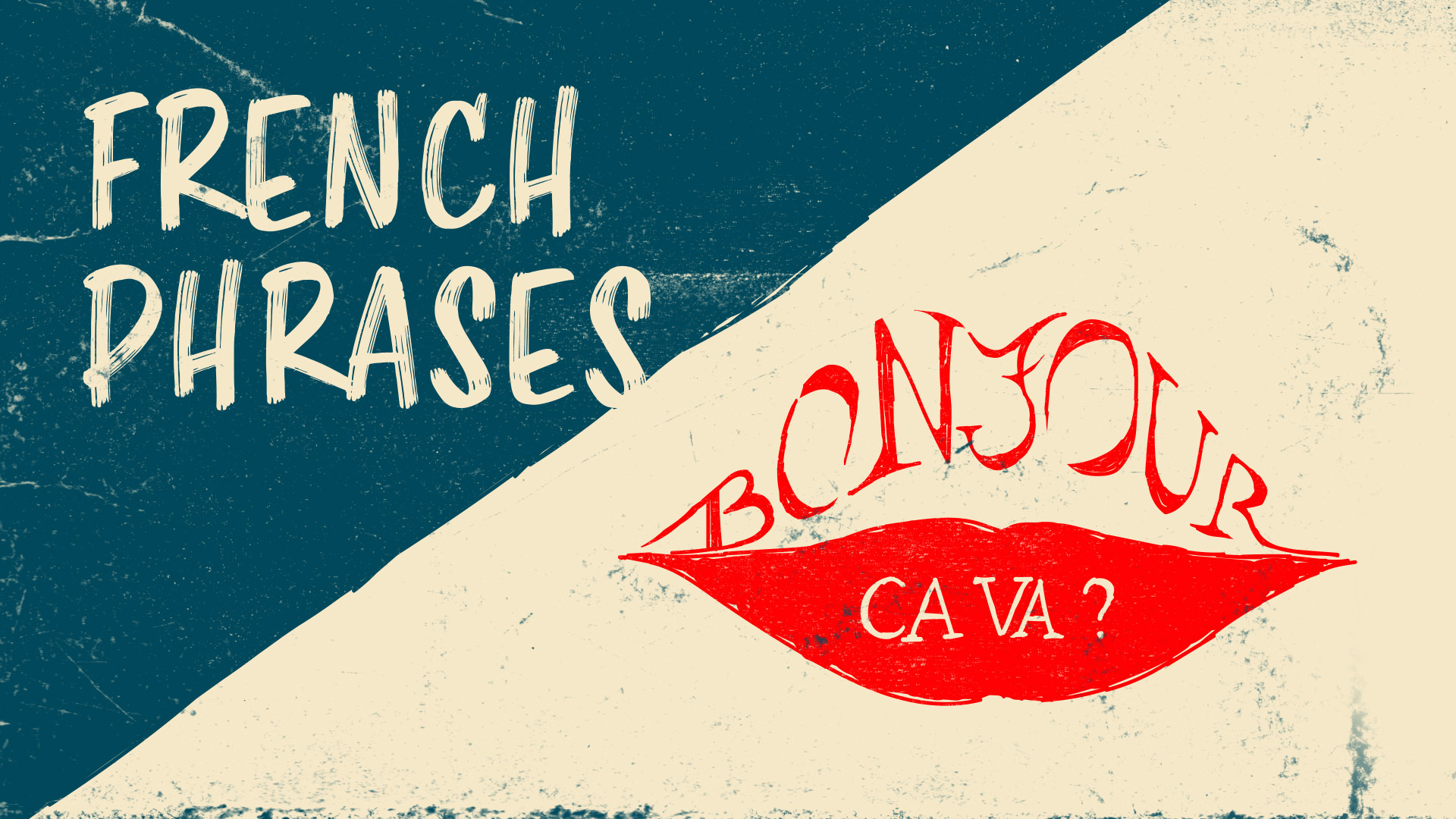
Full disclosure: This post contains affiliate links. ?
written by Benny Lewis
Language: French
Reading time: 17 minutes
Published: Jan 11, 2021
Updated: Sep 17, 2021
60+ Essential French Phrases for Beginners to Start Speaking Now
What are some French sayings? What are the most common phrases in French? And can learning a few powerful French phrases really help you start speaking right away?
Absolutely!
Even if you'll only be spending a short time in the country, learning a few basic French phrases can be very rewarding and make a big difference to your trip.
Let’s start by mastering some of the most common French phrases you need to know as a beginner:
I've long advocated that set phrases are the best thing for beginners to learn when starting out.
After all, isn't the goal of language learning to communicate?
How do you expect to communicate with anybody if the only thing you've learned so far is a verb table?
So whether you're planning to travel to Paris for a week or move to Saint-Louis-du-Ha! Ha! for the rest of your life, here are the most important and useful French phrases that you should learn A.S.A.P.
Listen to the French Phrases:
Here's a quick “French phrases” video I made that will help you with pronunciation for most of the phrases in this article:
Before we get started, if you’re looking for an online French course, here’s the course I recommend: French Uncovered – Learn French Through the Power of Story, a course with a fascinating new method by my friend Olly.
French Greetings and Polite Phrases
Bonjour – “hello”.
There are many ways in French to say “hello” , but bonjour is undoubtedly the most well-known. It's universally polite and friendly, whether the situation is formal or informal.
Bonjour is a combination of the words bon (“good”) and jour (“day”).
In the evening, you could also say bonsoir (“good evening”). A more casual way to greet people is salut , which can mean either “hi!” or “bye!”.
S'il vous plaît / s'il te plaît – “Please”
As a tourist, the last thing you want to be is rude. So when in France, remember what your mother taught you, and say s'il vous plaît (“please”) when making a request.
You can also say s'il te plaît. What's the difference? It's all about “you”:
In French there are two ways of saying “you”.
Tu is what you'd use when addressing a friend. Vous is a more polite and formal version, best used when talking to a stranger or older person.
( Vous is also what you should use when addressing a group of people in any situation, similar to saying “you guys” or “you all” in English).
So s'il vous plaît and s'il te plaît both mean “please” (literally, “if it pleases you”), but s'il vous plait is the more polite version. If in doubt, use s'il vous plaît .
(Why is it s'il te plait and not s'il tu plait ? It's a grammatical thing that you don't need to worry about as a beginner. Just learn the phrase as a whole for now, and things will become clear later.)
In fact, when asking for something in French – e.g. asking a stranger for directions or asking to see a menu in a restaurant, you should start with “ Bonjour. S'il vous plaît… ” It literally means “Hello, please…”, which would sound a bit strange in English, but it's the normal way to start a polite request in French.
Comment vous appelez-vous? / Comment t'appelles-tu? – “What’s your name?”
When meeting anyone, one of the first things you'll want to know is their name.
In French, you can find it out by asking “ Comment vous appelez-vous? ” (formal) or “ Comment t'appelles-tu? ” (informal).
Literally, these questions mean “what do you call yourself?”. You could also ask “ c'est quoi ton nom? ” – which is a more literal translation of “what's your name?”
If you're on the receiving end of this question, answer with “ Je m'appelle… ” (“my name is”, literally “I call myself”) or a simple “ Je suis… ” (“I am…”).
Oui/Non/Si – “Yes/No”
Two essential words to learn in any language are “yes” and “no”. In French, “yes” is oui and “no” is non .
Informally, it's also common to say ouais or ouaip instead of oui – like saying “yeah” or “yep” in English.
Then you have si . This is a handy little word that has no direct equivalent in English. Use it to say “yes” when someone asks you a negatively phrased question.
To illustrate what I mean, imagine that someone asks you, in English, “haven't you been to Paris?”
If you reply “yes”, it's not exactly clear what you're saying. Do you mean “yes, I have been to Paris – contrary to your assertion” or “yes, you're correct: I haven't been to Paris”?
French avoids this confusion with the word si . It means “yes”, but more specifically it contradicts the assertion in the question. In the above example, if you say si , it clearly conveys that you have, in fact, been to Paris.
Si is one of many linguistic features that I sorely miss when I speak English.
Comment allez-vous? – “How are you?”
This is the polite way of saying “how are you?” in French. Note the use of the polite vous rather than the informal tu .
Another, more informal way to say “how are you?” is ça va ? This phrase is extremely common – when in France you'll likely hear it several times per day.
If someone asks you “ ça va? ”, you can respond with a simple “ ça va bien ” – “it's going well”.
Excusez-moi – “Excuse me”
To get someone's attention, whether they're a waiter in a restaurant or a stranger on the street, say “ excusez-moi ”, “excuse me”.
This is also the polite way to ask someone to get out of your way. For example, if you're trying to exit a crowded train, a soft “ excusez-moi ” should (hopefully) be enough to make people step aside.
Pardon – “Sorry”
Picture getting off a crowded train, being careful you don't bump into anyone as you walk through the crowded metro station. But if a collision does occur, it's fine. Just say pardon , “sorry”, and all will be forgiven.
“ Pardon? ” is also how you'd ask someone to repeat themselves if you didn't hear or understand what they said. In this case, you should say it with a rising tone to indicate that it's a question.
Another way to say this is “ pourriez-vous répéter, s’il vous plaît ?” – “Could you repeat, please?”
Merci beaucoup – “Thanks a lot”
And of course, don't forget to say thank you!
The French word for “thank you” is merci . Or you can make it stronger by saying merci beaucoup – “thanks very much”.
Use merci in all the same situations you'd say “thank you” in English.
Other Must-Know French Greetings and Polite Phrases:
- Nice to meet you – Enchanté
- How’s it going? – Comment ça va?
- And you? – Et toi?
- Are you well? – Vous allez bien?
- What’s new? / What’s up? – Quoi de neuf?
- Good, thanks! – Bien, merci!
- So-so / It’s okay – Comme ci, comme ça (Literally: “like this, like that”)
- Same as always – Comme d’hab
- It could be worse – Ça pourrait être pire
- You’re welcome – Je t'en prie
- Don’t mention it / You’re welcome – De rien
- Goodbye – Au revoir
- See you soon – À bientôt!
French Phrases for Maintaining a Conversation
Je voudrais parler français – “i would like to speak french”.
The French are famously protective of their language. Sometimes they can be a bit impatient with us anglophones, and reply in English to your imperfect French questions.
It's frustrating when this happens, but if you ever want to make progress in a foreign language, you absolutely must stop speaking English !
Be polite but firm when someone tries to speak English with you – tell them “ Je voudrais parler français ” – “I'd like to speak French.”
Note that, unlike in English, names of languages are not written with a capital letter in French.
Je ne comprends pas – “I don’t understand”
Sometimes pardon doesn't quite cut it. If you really can't figure out what the other person is saying, try telling them “ je ne comprends pas ” – “I don't understand.”
There's no shame in being a beginner! Just remember not to fall back to English when the going gets tough. If you don't understand something, persevere in French anyway – it's the only way you'll learn.
Que veut dire ça? – “What does that mean?”
Maybe the reason you didn't understand is because there was a specific word you didn't recognise. If that's the case, say “ que veut dire X? ” – “What does X mean?”
You can also phrase this as “ ça veut dire quoi? ” – “What does that mean?”
Plus lentement – “More slowly”
Sometimes, vocabulary isn’t the problem. You’d know the words if you could make them out, but you can't because the other person is talking too fast!
In this case, try saying plus lentement – “more slowly”.
Better yet, say a full sentence: “ Pourriez-vous parler plus lentement, s’il vous plaît? ” – “Can you speak more slowly, please?”
Comment dit-on __ en français? – “How do you say __ in French?”
What if you need to say something in French, but the exact word escapes you?
Just fill in the blank in the above sentence: “ Comment dit-on X en français? ” means “How do you say X in French”?
A side note: the pronoun on , seen above, is an interesting one. It’s a colloquial alternative to nous (“we”). However, on is also used to refer to an unspecified person or people in general, like the word “one” is sometimes used in formal English. (If you speak German, note that on in this sense is like the German word man .)
One doesn't use the word “one” very much in modern English – one finds it rather old-timey and stuffy. These days you normally use “you” when you're talking about people in general.
Comment ça s'écrit? – “How do you spell that?”
If you learn a new French word using the phrase above, you might want to write it down before you forget it.
Unfortunately, French spelling isn't the easiest.
The relationship between spelling and French pronunciation can be complicated. Generally, it's easier to figure out a word's pronunciation from its spelling than it is to know its spelling from its pronunciation. I wrote a guide to help you with French pronunciation here .
So if you're not sure, ask someone “ comment ça s'ecrit? ” – “How do you spell that?” Literally: “How does that write itself?”
Or if you don't trust your own transcription abilities, try asking them to write it for you: say “ Est-ce que vous pouvez l'écrire? ” – “Can you write it (down)?”
Other Helpful Phrases for Maintaining a French Conversation:
- Can you speak more slowly please? – Pouvez-vous parler plus lentement s'il vous plaît?
- Can you say it one more time? – Pouvez-vous le dire une fois de plus?
- Do you speak French? – Parlez-vous français?
- Do you understand? – Comprenez vous?
- What do you do for a living? – Qu’est-ce que tu fais dans la vie?
- How old are you? – Quel âge as-tu?
- I’m _ years old – J’ai _ ans
- Where are you from? – D'où êtes-vous?
- I’m from… – Je viens…
- Are you married? – Es-tu marié?
- Are you single? – Es-tu célibataire?
- When can we meet? – Quand pouvons-nous nous rencontrer?
- What’s your phone number? – Quel est ton numéro de téléphone?
French Phrases for Getting Around
Où est… – “where is…”.
Struggling to find your way around? Not to worry. Just get a stranger's attention (remember what phrase would you use to do this?) and ask “ où est X ” – “Where is X?”
“X” could be many things: la Tour Eiffel, le Louvre, Notre Dame … or perhaps something less exotic, like le metro or un restaurant .
Où se trouve la station de métro la plus proche? – “Where is the closest metro station?”
Another way of saying “where is it?” is où se trouve , literally “where is (it) found”.
Here's an example of où se trouve combined with another handy phrase to know: la station de métro la plus proche means “the closest metro station”.
One more piece of useful vocabulary: once you're in the metro station, you might want to ask someone “ où est le guichet? ” – “Where is the ticket window?”
Je voudrais acheter un billet – “I would like to buy a ticket”
Now that you've found the guichet , you probably want to buy a billet – a ticket. But what type of ticket do you want?
- un billet aller simple – a one-way ticket
- un billet aller retour – a round-trip ticket
Make your decision, and tell the assistant “ je voudrais un billet aller simple/retour pour X ” – “I would like to buy a one-way/round-trip ticket to X”, where X is your destination.
C'est combien? – “How much is it?”
France isn't the cheapest of countries – so whether you're at the guichet or elsewhere, it doesn't hurt to be price-conscious.
To ask how much something costs, say “ c'est combien? ” – “how much is it?” You can also say “ Combien ça coûte? ” – literally, “how much does it cost?”
Où sont les toilettes? – “Where are the toilets?”
It's worth learning this phrase, because you might need it in a hurry! Où sont les toilettes means “where are the toilets?”
Although if you want to use a public toilet, you could be searching for a long time.
They aren't very common in France – and if you do find one, you'll probably have to pay to use it. You're probably better off buying something in a café and using their toilets instead.
(Why is it “ où sont “, when previously we used “ où est “? Easy: sont means “are” while est means “is”. Since toilettes is plural, you must use sont , not est – “where are the toilets?”, rather than “where is the toilets”, which wouldn’t make sense.)
À quelle heure est-ce qu’il faut régler la note? – “What time is check out?”
If you're checking into a hotel in a French-speaking country, one useful thing to know the checkout time.
One way to find this out is to ask “ à quelle heure est-ce qu’il faut régler la note? ” – “What time must we check out?”
Another similar expression is: “ quelle est l'heure limite d'occupation? ” (Lit: “What is the occupancy cut-off time?”
La carte/le menu, s’il vous plaît. – “The menu, please.”
France is famous for its food, so while you're there, you'll probably want to dine in a restaurant or two!
When dining out in any language, there are usually a few subtleties around how to order. Here I'll explain one of the more important things to know in French: the words for “menu”.
I say “words” because there are two main ways to say “menu” in French.
The general word is carte , which you may recognise from the expression à la carte .
A carte is what you typically think of when you hear the word “menu”. It's a list of individually-priced options; you pick and choose what you want, then add up the prices to get your total bill.
But you can also ask for a menu , which is usually called a “fixed-price menu” in English. When ordering from a menu , you pick an option for each course (starter, main course, etc.) and pay the same, fixed price no matter what you selected.
Whichever option you choose, inform the serveur/serveuse (“waiter/waitress”) by saying “ la carte/le menu, s’il vous plaît ” – “the menu/fixed-price menu, please.”
Je ne peux pas manger… – “I can’t eat…”
This doesn't apply to everybody, but for those to whom it does apply, it's very important: informing the waiter about your dietary restrictions.
The simplest way to do this is to say “ je ne peux pas manger de X ” – “I can't eat X”. Here are some of the more common ways to fill in the blank:
- cacahuètes – peanuts
- noix – nuts
- gluten – gluten
- fruits de mer – shell fish
- œufs – eggs
- poisson – fish
- produits laitiers – dairy products
- viande – meat
If you're vegetarian, say so with “ je suis végétarien ” (for men) or “ végétarienne ” (for women.)
A vegan is a “ végétalien(ne) “, although végan/végane is sometimes used too.
You could also explain “ je ne consomme pas de produits animaux .” – “I don't consume animal products”
Nous voudrions commander maintenant. – “We would like to place an order now.”
To “order” in French is commander , when you're talking about ordering something in a restaurant.
Don't confuse this with ordonner , which is used in the sense of “to order a person to do something”, such as in the military.
After receiving the carte or the menu , and perhaps informing the waiter of your dietary restrictions, you may be given some time to make a decision. When you're ready, say “ nous voudrions commander maintenant ” – “we'd like to order now.”
It’s also acceptable in nearly any restaurant to use on instead of nous for we, as I mentioned earlier: On voudrait commander maintenant.
Or if you're by yourself, say je voudrais (I'd like) instead of nous voudrions (we'd like). Bon appétit!
L’addition, s’il vous plaît. – “The bill, please”
One final bit of restaurant-related vocabulary – the bill (or “check” if you're American) is l'addition .
So when you're ready to leave, say l’addition, s’il vous plaît – “the bill, please”.
You’ll often hear la facture used in Quebec instead of l’addition – however both are perfectly understandable to waitstaff.
Other French Phrases for Out and About in France:
- Can you help me please? – Pouvez-vous m'aider s'il vous plaît?
- I would like… – Je voudrais…
- I’d like one of those please – J'en voudrais un s'il vous plait
- Three: Trois
- Four: Quatre
- Five: *Cinq
Learn more: French Numbers: Counting in French from 1 – 100+
Romantic French Phrases
Je t'aime – “i love you”.
Finally, let’s talk about love.
They say that French is a romantic language, so maybe in your travels you'll find love on the road? Or maybe after you get home, you'll want to use your newfound French skills to woo that special someone.
So how do you say “I love you” in French?
The French word for “to love” is adorer – but you generally only use this word when talking about things rather than people, for example to say that you love a place, book, or song.
When talking to a person, say je t'aime . Aimer usually means “like”, but in this context it means “love” in the most romantic of senses. Use it wisely!
Here are some other romantic French phrases:
- My heart – Mon cœur
- My love – Mon amour
- You’re beautiful – Tu es belle (to a woman); Tu es beau (to a man)
- You’re too cute – Tu es trop mignon
- I like you (Lit: “You please me”) – Tu me plais
Bonus: French Slang
Wondering what a famous French saying is that you could use in everyday life? Or how do you say “cool” in French slang?
Here are some bonus French sayings and slang to level up your French:
- Cool – Cool (yes, really! Just say it with a French accent 😉)
- Awesome – Génial
- That sucks – C’est nul
- That’s great – C’est top
- Don’t worry – T'inquiète
- Losing my mind – Perdre la tête
Over to You
Can you think of any other useful French phrases for tourists? What are the most important words and phrases for beginners to know? Let us know in the comments.
And if you’re ready to learn more French, check out the 111 core French words that are commonly used. Or learn some more fun French slang !
Benny Lewis
Founder, Fluent in 3 Months
Fun-loving Irish guy, full-time globe trotter and international bestselling author. Benny believes the best approach to language learning is to speak from day one .
Speaks: Spanish, French, German, Italian, Portuguese, Esperanto, Mandarin Chinese, American Sign Language, Dutch, Irish
Have a 15-minute conversation in your new language after 90 days
Survival French: 120 Must-know Phrases for visitors to France
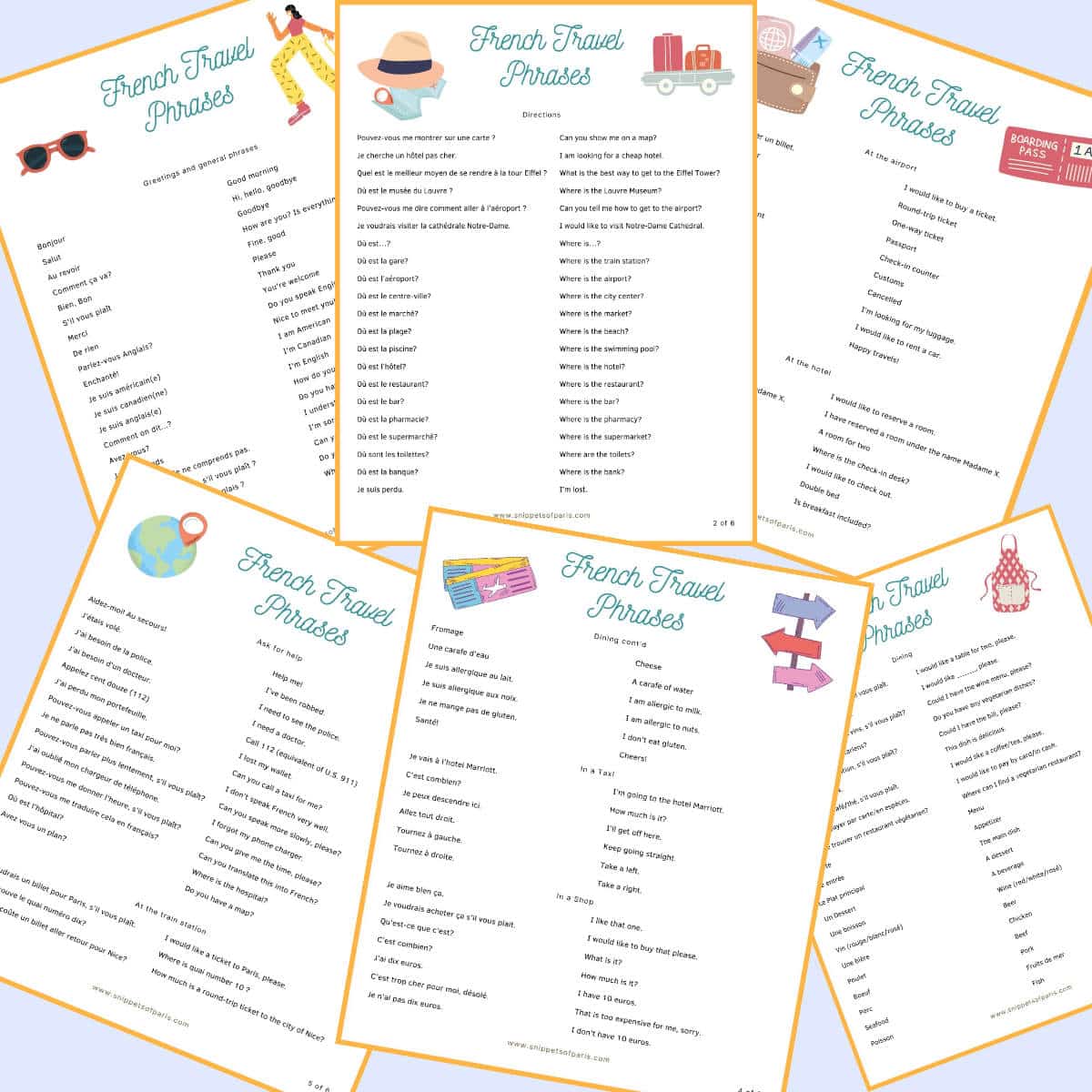
- Post category: French Language / Travel to France
- Post author: Nassie Angadi
If you are planning a trip in France, you may want to learn a few french travel phrases to make the most of your visit. Travel can be stressful, so there’s no better way to calm your nerves than by understanding the local language .
The French are notoriously shy about speaking English, so a few phrases in French is bound to put everyone at ease. In this article, I will cover some useful phrases in various instances, from asking directions, ordering at a restaurant, going somewhere in a taxi, etc.
So, without further ado, let’s take a look at the top useful French travel phrases for your big trip to France. Allons-y!
Greetings and general phrases
There is quite a lot of different French greetings but the most basic is the Bonjour . If there is only one word to remember on your trip, this is the one.

Asking for help
You can find more information on calling emergency numbers in France here.
At the airport
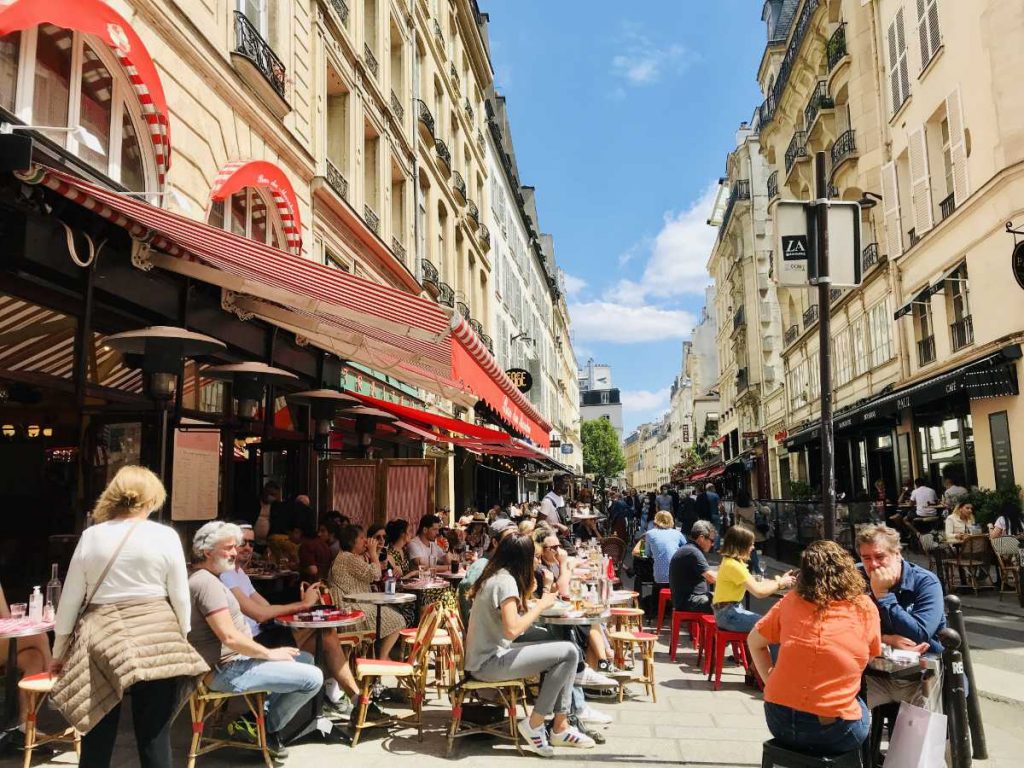
Food, restaurants and dining out
You can find more French food culinary terms here and top foods to eat in France here.
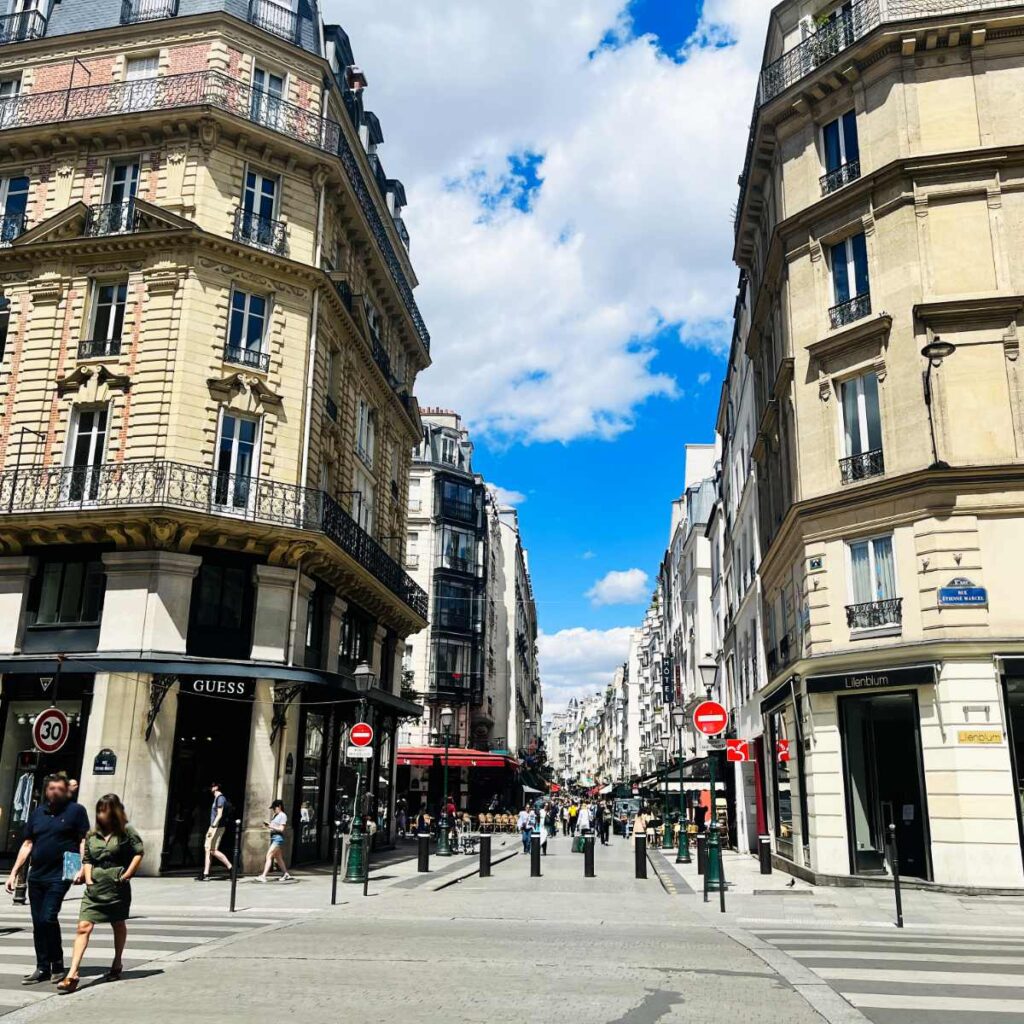
At a train station
For more numbers in French , you can find my printable here.
In a museum
You can find the top museums in Paris here.
If you enjoyed that article, you may like to download the list in printable format below. You can also read more about traveling to Paris here. A bientôt!

You Might Also Like
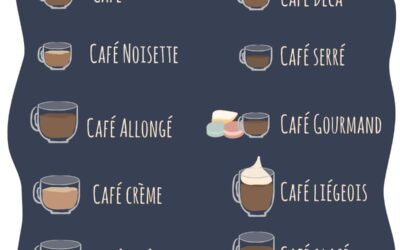
12 Types of French coffee explained
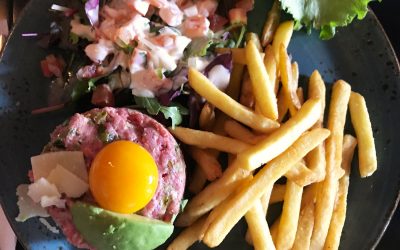
Best French Foods & drinks: 42 Traditional dishes to enjoy
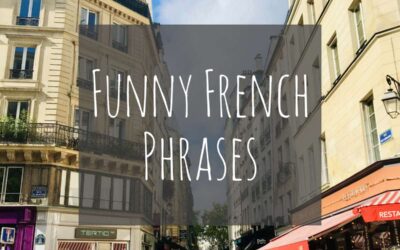
30 Funny French Phrases & Idioms (Life, Animals and more)
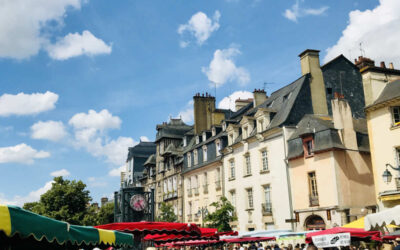
12 Best Markets in France to visit
Leave a reply cancel reply.
- Paris & Île-de-France
- Alsace & Lorraine
- Bourgogne-Franche-Comté
- Bretagne & Normandy
- Auvergne Rhône Alpes
- Loire Valley
- Northern France
- Nouvelle Aquitaine
- Provence & French Riviera
- Festivities
- Facts and history
- Get the Look
- Moving to France
- Appetizers & Starters
- Main dishes
- Side dishes
- Common Questions?
- Newsletters
Europe , French , Paris
13 French Phrases You Need to Know When Visiting Paris
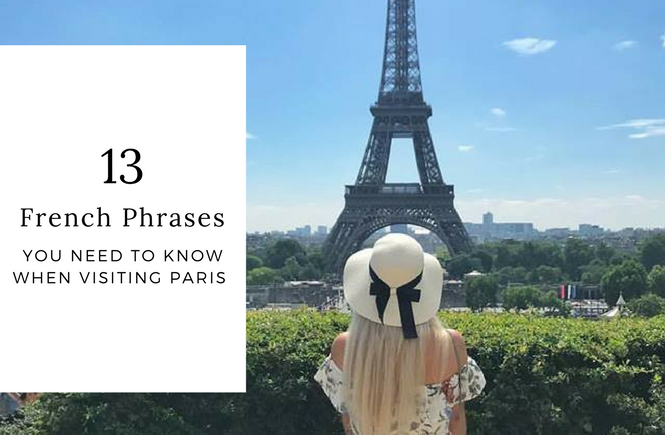
Coucou everyone! Today I want to talk about the 13 key French phrases you should know if you plan on visiting Paris, and how to pronounce them.
I love France and I want every single American who visits this beautiful country to have a positive experience. While I strongly disagree with the stereotype that the French dislike Americans, I will admit that a guaranteed way to make a bad impression when visiting France (or any country) is by not making an effort to learn the language.
No one is expecting you to say everything perfectly, but showing you’re willing to try goes a long way in their books!
To get you started, here are 13 French phrases that will help you communicate in France. I have included pronunciations for each below but I want to include a disclaimer: My French is not perfect and I know this.
My goal is not to pretend to be a French teacher, but rather to be an internet friend who can help you get by while visiting Paris. ☺
So, allons-y!
Which means: Hello!
Bonjour literally translates to “Good Day” so while you can use it as your standard greeting, it’s best suited in the day time.
This is probably the most known French word among Americans but unfortunately it’s also one of the most mispronounced. You don’t want to say “bawn-jOR”, unless you want every French person within a 10 foot radius to cringe.
Here is a clip of me demonstrating the wrong ways to pronounce bonjour , and then I’ll show you how to say it the correct way. ☺
Bonne Journée
Which means: Have a good day.
You should say this when leaving a place in the daytime, just like you would say “have a good day” in English.
Here’s how to pronounce it correctly:
Which means: Good Bye
Which means: Good Evening
Bonsoir is like the night version of Bonjour. You will use it in the exact same circumstances as you would Bonjour, except only when it’s the evening.
Here’s how to pronounce it:
Bonne soirée
Just like bonne journée means “have a good day” and is used when exiting, bonne soirée means “have a good evening” and is used in the same fashion.
Here is how to pronounce it:
Note: For some reason a lot of non-French speakers will say “bonne nuit” in this situation, which is incorrect. You would never say bonne nuit when leaving a shop or restaurant because it means “goodnight,” as in you are going to sleep.
You would instead say bon soirée.
Which of course means: Thank You.
Everyone knows merci , but few people pronounce it correctly.
I’m sorry dear friends and family, I love you all so much, but most of you absolutely butcher the word merci. But I am here to help!
You don’t want to say “mercy”, like Lord have mercy. And you also don’t want to say MARE-ci, like the beginning of the word Mary + see.
I realize this word can be tough because the French R is nearly impossible for non-French speakers, but you can get close enough just be switching your pronunciation a bit.
Here is me showing the wrong ways to pronounce merci, and the correct way.
This is word is especially important to learn if you’re visiting Paris: Pardon is what you say when you bump into someone on accident.
It’s used in the same way we would say sorry or oops when navigating in public.
The pronunciation of pardon is quite different from the English pardon, so make sure to give this clip a quick listen so you can hear the difference.
Note: For some reason, many visitors will say “excusez-moi” instead of pardon which technically works but isn’t how the French do it.
Saying “excusez-moi” can have a more formal/harsh connotation behind it, and I know that’s not how you want to come off when apologizing for bumping into someone!
(Of course if you’re trying to squeeze past someone or are tapping someone on the shoulder, “excusez-moi” works perfectly in those scenarios).
S’il vous plait
I know you know what this one means… Please!
The French take manners very seriously, so feel free to use s’il vous plait sincerely and often.
When asking for help or directions, ordering food, or speaking to literally anyone, open your request with s’il vous plait and I guarantee you will have a better experience in France.
Here’s the wrong way to pronounce s’il vous plait , and the correct:
DÉSOLÉ, JE PARLE PAS FRANÇAIS!
Here’s an important one you will definitely want to know: Sorry, I don’t speak French!
If you find yourself in a tough spot, there is no shame in saying “hey man, I know I pronounced bonjour like a professional Parisienne, but I actually have no idea how to speak French!”☺ In fact, they will respect you for admitting it and will probably be pumped to practice their English.
Note: You will notice I left out the “ne” before parle, which is not the correct formation of this sentence. This is because it is very common in conversational French to drop the “ne”…and I’m operating under the assumption that you still want to sound super French, even when admitting you can’t speak the language. *wink*
C’EST GENTIL
Which means: That’s Nice, or That’s Very Nice of You.
I’m including this one because I didn’t know how to express this sentiment until I arrived in Paris, and now I use it all the time.
C’est gentil is used when a stranger does something small but kind for you, like give up their seat on the train for you, or pick up something that you dropped.
*Note: you don’t pronounce the L
L’addition, S’Il vous plait
Which means: The check, please!
PS. While on the topic of dining I want to make a quick side note: Never, ever, ever, ever, EVER say “garçon” in a restaurant in France. It is one of the most insulting things you can say. Thanks ☺
Je prends un verre de vin
Last but not least, a phrase you will definitely need to know: How To Order Wine!
There’s two ways to order a glass of wine in French and I will teach you both. It’s a matter of preference and what you’re comfortable with saying because both work just fine.
- Je prends un verre de vin, which literally translates to “I will take a glass of wine.”
- Je voudrais un verre de vin, which translates to “I would like a glass of wine.”
Of course you would replace the word “vin” with the name of the wine you’re ordering, but I don’t need to tell you that.
Here’s how to pronounce both:
And there you have it! The 13 French Phrases that will help you walk around Paris like a true Parisienne.
What are some key phrases everyone should know in your country?
You may also like
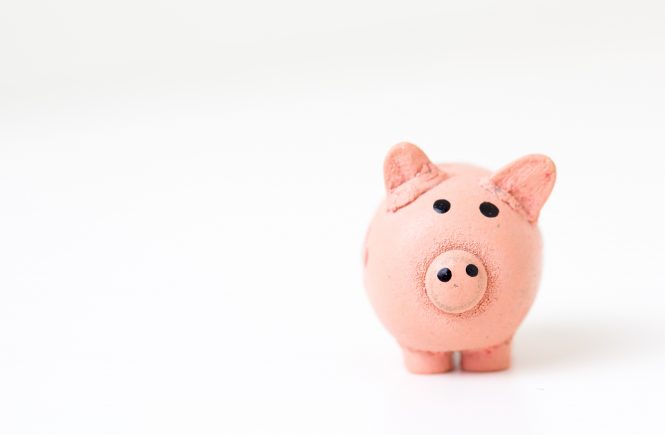
How to Travel When You’re Poor

How to Become an Au Pair In Paris Part 2: Getting Your Visa
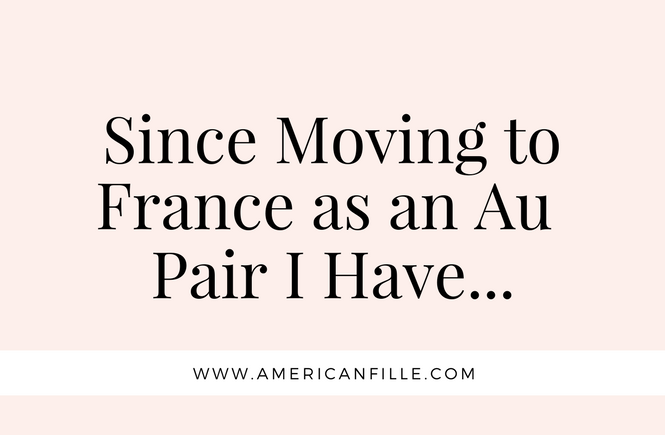
Since Moving to France as an Au Pair I have…
This has been very informative! Thanks so much and look forward to more posts!
Aw thank you, I’m glad you liked it!
So helpful! Can’t wait to go back to France!
Thank you for your support! 🙂
Leave a Reply Cancel reply
Your email address will not be published. Required fields are marked *
Save my name, email, and website in this browser for the next time I comment.
Cyber Monday Sale 70% Off - Start Your Free Trial - LIMITED TIME

20 Basic French Travel Phrases for Beginners

When traveling to a French-speaking country, having a basic understanding of the local language can greatly enhance your experience.
Learning a few essential French travel phrases not only enables you to communicate with locals but also shows respect for their culture and makes your interactions more enjoyable.
Today, we will introduce you to 20 basic French travel phrases that are perfect for beginners. Each section will focus on a specific category of phrases, providing translations, guidance, and example usage.
We will leave you with some tips for learning French at home. Follow this guide, and you'll be speaking French in no time.

20 French Travel Phrases
Let's dive into our comprehensive list of 20+ essential French phrases so you have the tools necessary to make yourself understood in France.
We will kick things off with greetings and polite expressions so you can conduct yourself well on your trip to France.
Greetings and Polite Expressions
When interacting with locals in a French-speaking country, it's important to start with a friendly greeting.
- Bonjour - Hello
The phrase bonjour is the most common and widely used greeting in French. It sets a positive tone for your conversation. You can use this greeting all day.
- Bonsoir - Good evening Bonne soirée - Have a good evening Bonsoir is used in the evenings, from around 6 pm onward as a greeting. Meanwhile, bonne soirée is used to express the desire that someone else will have a nice evening.
- Bonne nuit - Good night Just as in English, you would use bonne nuit as "good night" before going to bed.
- Au revoir - Goodbye When leaving someone at any time of day, au revoir is a polite and pleasant way to say "goodbye."
- Comment t'appelles-tu? - What's your name? (informal) Comment vous appelez vous? - What's your name? (formal) Quel est ton nom? - What is your name? (informal) Quel est votre nom - What is your name? (formal)
Once you have greeted someone, you can ask "What is your name?" either formally or informally, as the situation dictates.
- Je m'appelle... - My name is…
- Je viens de ... - I come from... La France - France L'Allemagne - Germany L'Espagne - Spain Le Royaume-Uni - The UK Les États-Unis - The US
- (Comment) ça va? - Are you alright? (most informal) Comment vas-tu? - How are you? (informal) Comment allez vous? - How are you? (formal) To show interest in someone's well-being, ask "How are you?" It's a common way to initiate a friendly conversation and display your courtesy. You can reply to ça va? with ça va or ça va bien , both of which mean "I'm alright". Or, use je vais bien , which also means "I'm alright".
- Merci - Thank you Learning to say "thank you" in the local language wherever you go will endear the natives to you. On your trip to France, you will find yourself saying merci all the time.
For instance, with the phrase ça va bien, merci. Et toi?, meaning "I'm good, thanks. And you?"
- De rien - You're welcome If someone thanks you in a French-speaking country, the standard reply is de rien .
- S'il vous plaît - Please (formal) S'il te plaît - Please (informal) When asking for something in a hotel, restaurant, among friends, or in any other situation, it is always best to say "please". As you can see, there is a more formal and less formal way to say "please". Use the informal with friends, and the formal in other social situations. If you are ever in doubt about whether to use formal language, it is best to err on the side of caution and go for the formal structure.
- Je suis désolé - I am sorry It is always worth knowing how to say sorry if you need to apologize for anything in French, for instance not understanding something or not knowing the answer to a question.
- Je ne comprends pas - I don't understand Je ne sais pas - I don't know
Can You Speak English/ French?
With the following phrases, you can swap out anglais ("English") and français ("French") with any other language, as needed.
- Pourriez vous parler français - Could you speak French?
- Parlez vous anglais? - Do you speak English?
- Je ne parle pas français - I don't speak French
- Je parle un peu français - I speak a little French
- Parlez lentement, s'il vous plaît - Speak slowly, please
Useful French Travel Phrases
One of the most important things to learn in French is how to ask for directions. Let's look at some common questions in French regarding directions.
- Où est la plage/ le gare - Where is the beach/ the train station You can use où est...? for any other singular object, such as la tour Eiffel ("the Eiffel Tower") and le bus ("the bus"). Just make sure to note the gender of the object so you use the right article.
- Où est le guichet? - Where's the ticket booth? Note that you can also say je cherche... , which means "I am looking for..."
- Où sont les toilettes? - Where are the toilets?
- Où sommes-nous - Where are we? As you can see, où means "where" in French. This is followed by a conjugated form of the verb "to be", être , and the object of the sentence.
- Excusez moi, je suis perdu - Excuse me, I am lost Finally, a handy phrase to know is "excuse me, I am lost". It's a good idea to keep a copy of your hotel information on your person so you can show people if you need help directing yourself home.
Miscellaneous Common French Phrases
Now that you have learned 20 French phrases for travel, we will list some other miscellaneous French phrases for everyday life in a French-speaking country.
- Je t'aime - I love you You will come across je t'aime in music, movies, and even on t-shirts, so it is worth knowing what it means. And you never know - you might want to use this French phrase yourself when you get to Paris, the city of love.
- Es-tu célibataire? - Are you single?
- Je ne sais quoi - I don't know what Paris is known as a romantic destination as it has a certain je ne sais quoi in the air that makes it so unique and magical.
- Je voudrais (un café) - I would like (a coffee)
- Un verre de vin - A glass of wine When in France, you will want to get your hands on a coffee or a wine as soon as you find the right spot to sit and people-watch.
- Je voudrais acheter... - I would like to buy…
- Combien ça coûte - How much does it cost?
- C'est trop cher - It's too expensive
Asking a question in French
Finally, a note on forming a French question. In general, to ask a simple question in French, you can use est-ce que. Take a look at the following basic French phrases.
- Est-ce que vous parlez français? - Do you speak French?
- Est-ce qu’il parle français? - Does he speak French?
- Est-ce qu’elle parle français? - Does she speak French?
How to Learn French at Home
So, now that you have this useful vocabulary list to get you started, you will want to know how to start learning French at home. One great method is to watch French TV shows and movies.
This provides natural exposure to French slang and colloquialisms , idiomatic phrases, the French accent, and French culture. You can find great French shows on Netflix and Lingopie. Both streaming services offer French and English subtitles, and Lingopie has bonus language-learning features like digital flashcards and an interactive transcript.
You can also listen to French podcasts and French songs like La Vie en Rose and Je ne Regrette Rien. Any engaging resource that familiarizes you with French pronunciation and introduces you to new French words in a natural way is a great language tool.
Of course, you can also sign up for online French classes or find a private tutor. Many language learners also enjoy using language-learning apps to supplement their learning. You can also buy a French phrasebook if you want to have all of your useful French phrases in one place.,
FAQs About French Phrases for Travelers
Now, let's take a quick look at some frequently asked questions about basic French phrases for travel.
Is there another way to ask "où sont les toilettes?"
Yes, there is another way to ask où sont les toilettes? which means "Where are the toilets?" You can also say où est la salle de bain? , which means "Where is the bathroom?"
Both are appropriate in public and formal situations.
Is it rude to say "je ne comprends pas" in French?
No, it is not rude to say "I don't understand" in French. You can make the statement more polite by saying je suis désolé(e), je ne comprends pas , meaning "I'm sorry, I don't understand".
You might want to add répétez s'il vous plaît , meaning "can you repeat, please", or je ne parle pas français , "I don't speak French."
How do you say "s'il vous plaît" informally?
The phrase s'il vous plaît ("please") literally translates as "if it pleases you", but it is used like "please" in English. You can say "please" informally in French by switching out the vous ("you" - formal) for te ("you" - informal). So, it sounds like s'il te plaît.

Summing Up: Basic French Travel Phrases
Now that you have started to learn these 20+ basic French words and phrases, you are ready to dive into the French language and start practicing today.
Whether you're asking for directions, ordering food, or engaging in basic social interactions, these phrases will serve as a valuable tool during your journey.
French learners can head over to Lingopie's streaming site for access to a host of awesome French TV shows and movies with interactive learning features.
Your language-learning journey starts today with the help of Lingopie and this comprehensive vocab guide. Have fun learning French at home.

Milena Andrade

Learn German with How to Sell Drugs Online (Fast)

Best Podcasts To Learn Portuguese
You might also like.
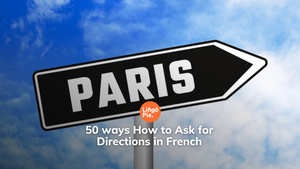
50 ways How to Ask for Directions in French

18 French Pick Up Lines Every Learner Should Know
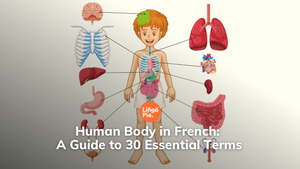
Human Body in French: A Guide to 30 Essential Terms

French Animal Sounds: A Fun Way to Learn French
Get the secret guide to language learning with tv and music for free, browse posts by popular tags.
- 15 French Slang Words To...
French Slang Words To Make You Sound Like a Local

Even people who have studied French for years occasionally suffer the embarrassment of being responded to in English by French people who are quick to pick up their accent. If you want to really fit in, it is necessary to learn French argot (slang),of which there is plenty!
Obsessed with culture and language? Our small-group trips are designed to give you an authentic, immersive experience wherever you go.
Many modern French slang words come from other words having been inverted. This rings true here with chanm é , which came from méchant , meaning badly behaved or ‘wicked’ and ordinarily used to describe a child. You will hear Parisians using it to mean ‘wicked’ in the modernised, positive sense of the word. This is an easy one to slip into conversation without sounding too forced.
«Le concert d’hier soir, c’était chanmé!»
“The concert last night was wicked!”
This can be used in numerous ways, but it certainly is not a pleasant word. It is basically used to describe anything that is a pain in the ass, be that a person or a situation.
«Le restaurant est ferm é le lundi ? Mais c’est chiant ca!»
“The restaurant is closed on Mondays!? How annoying!”
This verb can be used to mean ‘to eat’, but more in the sense of ‘to scarf’. With all the culinary delights of France , this word is sure to be useful! (‘La bouffe’ can also be used as a noun to mean ‘food’.)
«J’ai bouff é au moins 10 macarons – ils étaient super bons et j’avais très faim!»
“I ate at least 10 macarons – they were delicious and I was starving!”

This phonetic acronym of the phrase au calme was made popular by French rapper Booba with his 2014 single. It is used by young people to describe something that is ‘cool’ or ‘chilled’, in the ‘hip’ sense of the word. If you start following French people on Instagram, you will start to see it crop up more and more in captions:
«Une belle balade ce soir #oklm»
“A nice stroll this evening #chilled”
Laisse tomber
The French language history shows that this expression roughly translates to ‘let it go’, or ‘just forget it’. It is not a particularly aggressive phrase and is used in unimportant situations. For example, if you were struggling to understand someone and they had already repeated themselves numerous times, they may eventually tell you to laisse tomber .
«Laisse tomber, c’est pas grave!»
“Just forget it, it doesn’t matter!”
Avoir le seum
This is a way to express that you are unhappy about something or, perhaps more accurately, ‘pissed’ about something. This is true Parisian slang, and you will definitely impress people by dropping this into conversation. Most people of older generations will not have even heard of this expression.
«J’ai trop le seum, parce que mon équipe de foot a perdu le match hier soir.»
“I’m really pissed because my football team lost the game last night.”
Translates to ‘guy’ in a general sense, as a more casual way of describing a man, but is also commonly used to describe a boyfriend.
«Il est très agréable, ce mec — tu trouves?»
“He’s a really nice guy, don’t you think?”

The French are known for being a nation of smokers, so it likely that at some point during your stay, you may be asked if you have a spare clope , which is the slang word for a cigarette. The equivalent for us might be ‘a smoke’ or ‘a cig’.
«Je peux te taxer une clope, s’il te plait?»
“Could I pinch a smoke from you, please?”
Another insult that you may hear thrown about more often than you might think, mytho is an abbreviation of mythomana , literally meaning ‘a compulsive liar’, commonly used to describe someone who has been known to exaggerate the truth, often with the intent to make himself sound better.
«Ne l’écoute pas, il raconte des histoires. Il est gros mytho.»
“Don’t listen to him — he just makes stuff up. He’s a complete liar!”
Wesh , or w ech , is a slang greeting, used by most young people in an ironic way. It comes from the banlieues (suburbs) of Paris and originally came from rappers, who used the term to greet their ‘crew’. If you say this to a group of French people, you may well be laughed at, but it is certainly usable in texts or Facebook messages, in the same way we use ‘yo’.
«Wesh! Ça va?»
“Yo! How’s it going?”
Frais/fraîche
This is used exactly the same was as it is in English. Literally, frais means ‘fresh’ and will be used to describe food, but the younger generation also uses it to describe things that they deem ‘cool’. Certain people you will hear using it completely seriously, while others now use it with a little more irony, just like in English.
«Frérot, tu as des baskets fraiches!»
“Bro, those are some fresh sneakers you got on there!”

Among the beautiful French words is the word “ kiffer ” – a great, easy verb to throw into everyday conversation and a good way to pay someone a compliment. Kiffer is another way of expressing that you like something, in a much less formal way. Using this would be like saying that you ‘dig’ something. Occasionally replacing aimer with kiffer will be sure to make you sound like a local among young people.
«Je kiffe ton style.»
“I dig your style.”
As mentioned in a previous example, fr érot literally means ‘little brother’, but it is used as we would use ‘bro’ and not restricted to biological brothers . It is usually used affectionately among friends, but can be heard between ‘cool young men’ on the street. You may consider using with a hint of irony, particularly as a non-native French speaker!
«Yo, frérot, quoi de neuf?»
“Yo, bro, what’s going down?”
This is an informal version of the verb ‘to work’, i.e. travailler. Of course, you would not use it in conversation with your boss, but certainly among friends; it makes your French sound very authentic.
«Tu es toujours étudiant, ou tu bosses?»
“Are you still a student, or do you work?”
This is a casual word for a woman, most similar to the English ‘chick’ and used in the same way. It is neither complimentary nor particularly insulting when used on its own. Although some may find it slightly derogatory when used as ma meuf (my chick), there are others who would think nothing of it, so you can make your own mind up on this.
«Il n’arrete pas de parler de cette meuf.»
“He won’t stop going on about that chick.”

Bolos/boloss/bolosse
This is an insult used particularly (but not exclusively) against gullible or naive people. It could also be used against someone who is generally unappealing or ugly. Put simply, not something you would hope to hear said about yourself.
«Ton oncle est boloss quoi!»
“Is your uncle gullible or what?”
You probably will have learned the word grave to mean ‘grave’ or ‘serious’, which is of course correct. However, young people in France have also taken to using it as an adverb, like we do in English to say that something is ‘seriously’ good or ‘crazy’ fast.
«Cet gateau que tu as fait était grave bon!»
“That cake you made was crazy good!”
While this is not a French slang, strictly speaking, it is a colloquial phrase that you will hear time and time again, and it makes no sense when translated literally, so it is important to understand that it means ‘lots of’. You will find that it is easy to use once you get used to it.
«Il y a pas mal de bars dans le 19eme arrondissement.»
“There are plenty of bars in the 19th arrondissement.”
Feeling inspired to learn a new language? We’ve partnered with Rosetta Stone, a language learning provider. Find out more .
Browse our full collection of culturally immersive trips – where will you go first?
Since you are here, we would like to share our vision for the future of travel - and the direction Culture Trip is moving in.
Culture Trip launched in 2011 with a simple yet passionate mission: to inspire people to go beyond their boundaries and experience what makes a place, its people and its culture special and meaningful — and this is still in our DNA today. We are proud that, for more than a decade, millions like you have trusted our award-winning recommendations by people who deeply understand what makes certain places and communities so special.
Increasingly we believe the world needs more meaningful, real-life connections between curious travellers keen to explore the world in a more responsible way. That is why we have intensively curated a collection of premium small-group trips as an invitation to meet and connect with new, like-minded people for once-in-a-lifetime experiences in three categories: Culture Trips, Rail Trips and Private Trips. Our Trips are suitable for both solo travelers, couples and friends who want to explore the world together.
Culture Trips are deeply immersive 5 to 16 days itineraries, that combine authentic local experiences, exciting activities and 4-5* accommodation to look forward to at the end of each day. Our Rail Trips are our most planet-friendly itineraries that invite you to take the scenic route, relax whilst getting under the skin of a destination. Our Private Trips are fully tailored itineraries, curated by our Travel Experts specifically for you, your friends or your family.
We know that many of you worry about the environmental impact of travel and are looking for ways of expanding horizons in ways that do minimal harm - and may even bring benefits. We are committed to go as far as possible in curating our trips with care for the planet. That is why all of our trips are flightless in destination, fully carbon offset - and we have ambitious plans to be net zero in the very near future.

See & Do
Amazing day trips to take around corsica by boat.

Secret Alternatives to Busy Marinas in the French Riviera for Avoiding the Crowds

Food & Drink
The top french dishes you need to try.

Best Places to Visit in France From the UK

Must-Visit Food Markets in France

A Guide to Sailing in and Around France

Why Dijon Is the Perfect French Weekend Getaway

The Best Food to Eat in the French Alps

Amazing Day Trips to Take Around Brittany by Boat

The Most Beautiful Castles to Visit in Normandy, France

Places to Stay
The top spas to book in historic french cities.

A Guide to Sailing in Charente-Maritime, France
Culture trip spring sale, save up to $1,100 on our unique small-group trips limited spots..

- Post ID: 596604
- Sponsored? No
- View Payload

Know the basics
You can get just about anywhere with knowing the difference between “yes” and “no.” In need of a table for two for dinner? Oui. Ordering the most expensive caviar on the menu? Non (or maybe oui, depending on your budget). When you’re asked simple questions, you may be able to use oui or non to reach a conclusion — and if you don’t, let your English skills step in. Word to the wise: It’s even better if you add a merci (thank you) to the end of each statement.

The perfect greeting
Even if you can’t carry on the conversation in French, it’s always best to start it off the right way. Meaning, it’s a smart idea to start any dialogue — with a shop owner, tour guide, passerby, you name it — with Bonjour. S’il vous plaît… (Hello, please…). This simple phrase is useful when asking for directions, ticket prices, or really, just about anything, and shows the French that you’re making your attempt, even if the French skills stop there. In fact, in French culture, bonjour (or the more casual salut) carries the same weight as “please” does in the American culture. It’s a sign of respect and considered the most polite way to start talking to someone.
Have manners at a restaurant
It’s possible to skate without speaking French during most of your day — until mealtime hits. Depending on how touristy the restaurant is, they may offer you an English menu upfront. If they don’t, you can always ask, or just turn to Google Translate to figure out what the menu items actually are. When it comes time to order, start with je voudrais (I would like) followed by the dish or beverage of your choice — un verre de vin (a glass of wine), une bière (a beer), un steak (a steak), and so on. As always, finish it off with s’il vous plaît (please).
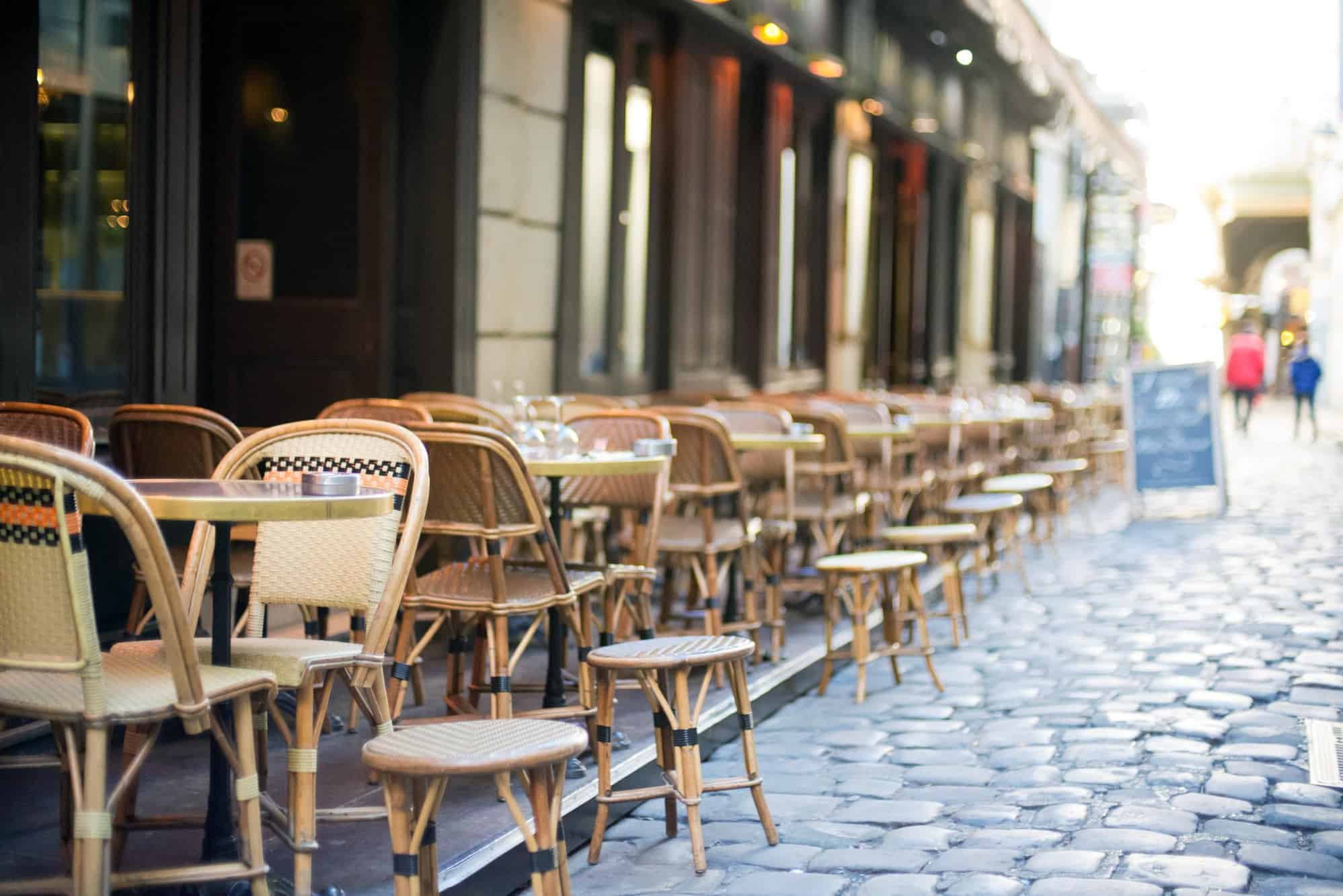
Ask if they speak English
In certain situations, you just need to cut to the chase. Rather than skipping straight to English, first figure out if the person that you’re speaking to knows English by asking Parlez-vous anglais? (Do you speak English?). This a more polite way to ease English into the conversation as well as a way to ensure that you’re talking to the best person who can help you out.
Know the most important locations
Of course, it’s a given that you should know the name of the hotel that you’re staying at. For safety measures, also make sure you know the names of it’s cross-streets and the nearest metro stop. Just in case you ever find yourself in a compromising situation — a stolen passport, for example — you should also know how to get to the American Embassy. If you don’t, ask Où est l’ambassade américaine? (Where is the American Embassy?). While this situation is rare, it never hurts to know this information.
Ask for directions
Sure, Google Maps exists, but sometimes a lack of data, WiFi, or phone battery will prevent you from getting from one place to the next. When in doubt, ask someone for directions. To ask for help, say Je suis perdu(e). Où est …? (I’m lost. Where is…?). Who knows, they may even give you a more scenic walk or a shortcut (both are equally incredible).
Memorize your safe words
While the chances are slim that you’ll find yourself in an emergency situation, it’s always a good idea to be prepared. If you feel scared or threatened for any reason, head to the closest open restaurant, store, or hotel, and let them assist you. To show the severity of the issue at hand, say, J’ai besoin d’aide; Je me sens menacé. (I need help; I feel threatened.) From there, you can get the help that you need.
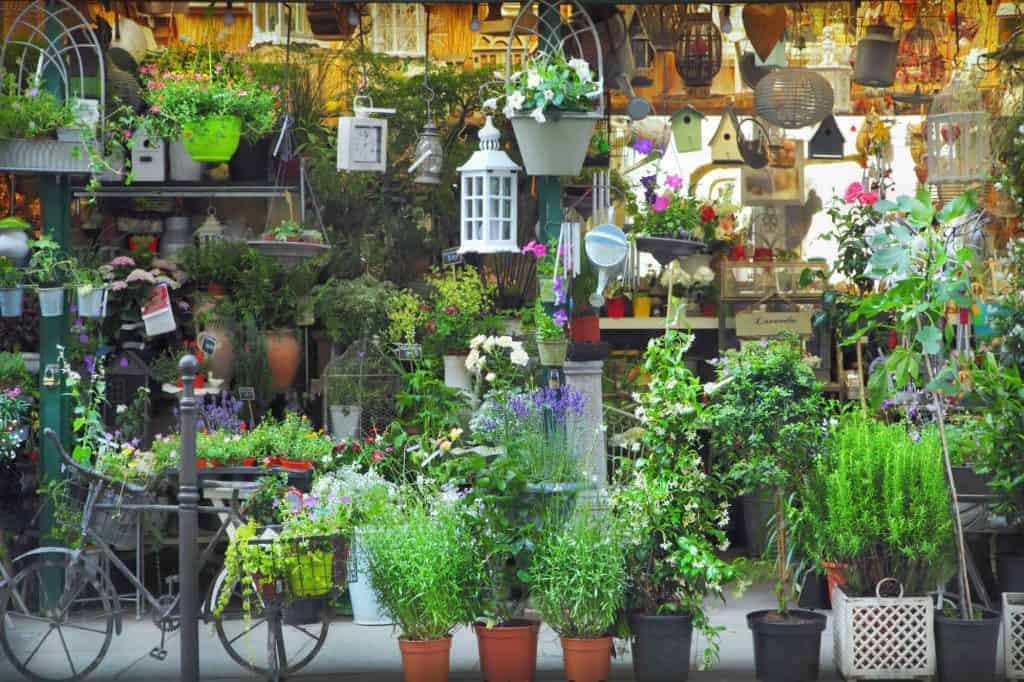
Remember that false friends exist
Let it be known that there are some words in French and English that look and possibly sound similar, but in fact, mean two very different things. If you’re looking at a bakery menu in France, raisin is the French word for grape, and prune is the French word for plum. A tad confusing. And if your guide recommends that you take a pit stop at hôtel de ville, beware that it’s actually a town hall and not a hotel. It may still be worth a visit either way.
Always, always, always give French a try
The French have a reputation — whether warranted or otherwise — to dislike American tourists. The best (and easiest) way to win them over is by attempting to speak their language whenever given the chance. A simple bonjour or au revoir goes a long way. Or better yet, say J’adore Paris (I love Paris) every chance you get.
Learn more about trips with Experi

- Virginia Beach
- History & facts
- Famous people
- Famous landmarks
- AI interviews
- Science & Nature
- Tech & Business
Discover something new everyday
- Famous places
- Food & Drinks
- Tech & Business
Paris - What you need to know before coming to Paris , Travel
30 must-know French phrases for your visit to Paris

Read Next →
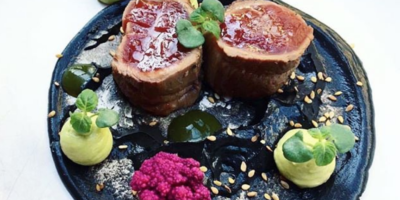
Paris - Food & restaurants
Top 20 non-touristy restaurants in Montmartre
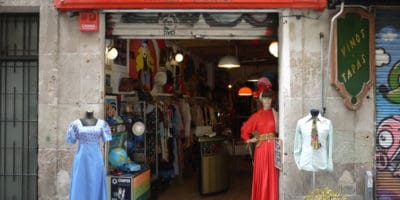
Barcelona - Activities & Things to do
20 Best Thrift Stores of Barcelona (with map)

Paris - By month
10 Best Techno Clubs in Paris
Où se trouve la station de métro la plus proche, une baguette, s’il vous plaît..
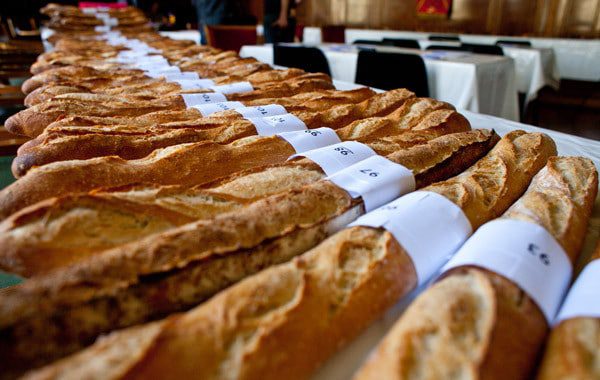
Je m’excuse.
Je ne comprends pas., où sont les toilettes.

L’addition, s’il vous plaît.

Bonjour / Bonsoir
Parlez-vous anglais, pouvez-vous m’aider, je parle un peu français., combien ça coûte, je souhaite aller à…, pouvez-vous m’indiquer le chemin, tout droit / à gauche / à droite, pourriez-vous nous prendre en photo, s’il vous plaît.

Acceptez-vous les cartes étrangères?

Où puis-je prélever de l’argent?

Parlez plus lentement, s’il vous plaît.
Comment vous appelez-vous.
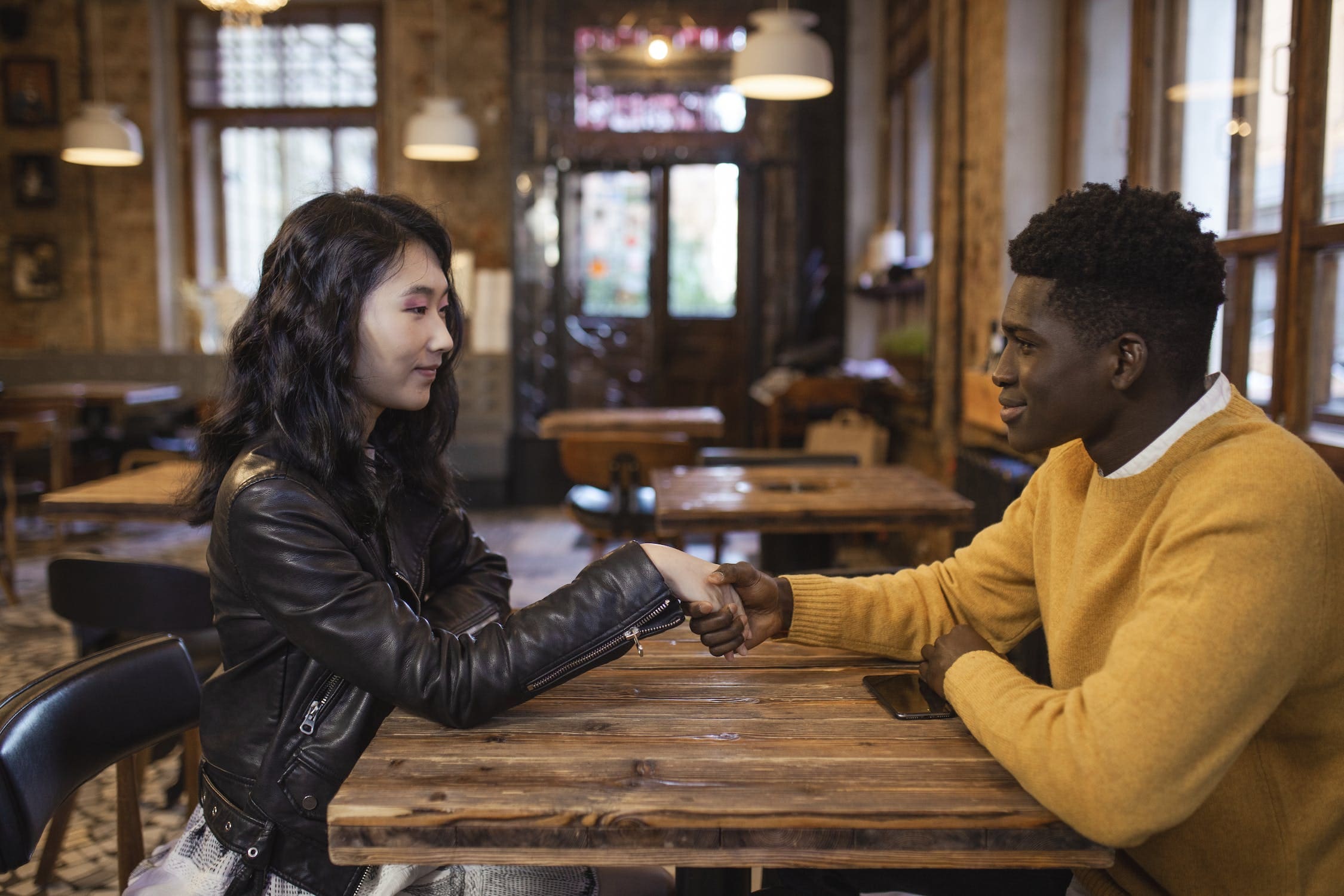
Photo by cottonbro studio from Pexels
Enchanté / Enchantée .
Nous restons., d’où viens-tu / d’où venez-vous, je suis là pour les vacances / le travail..

Photo by Michael Block from Pexels
Quel temps va-t-il faire aujourd’hui?
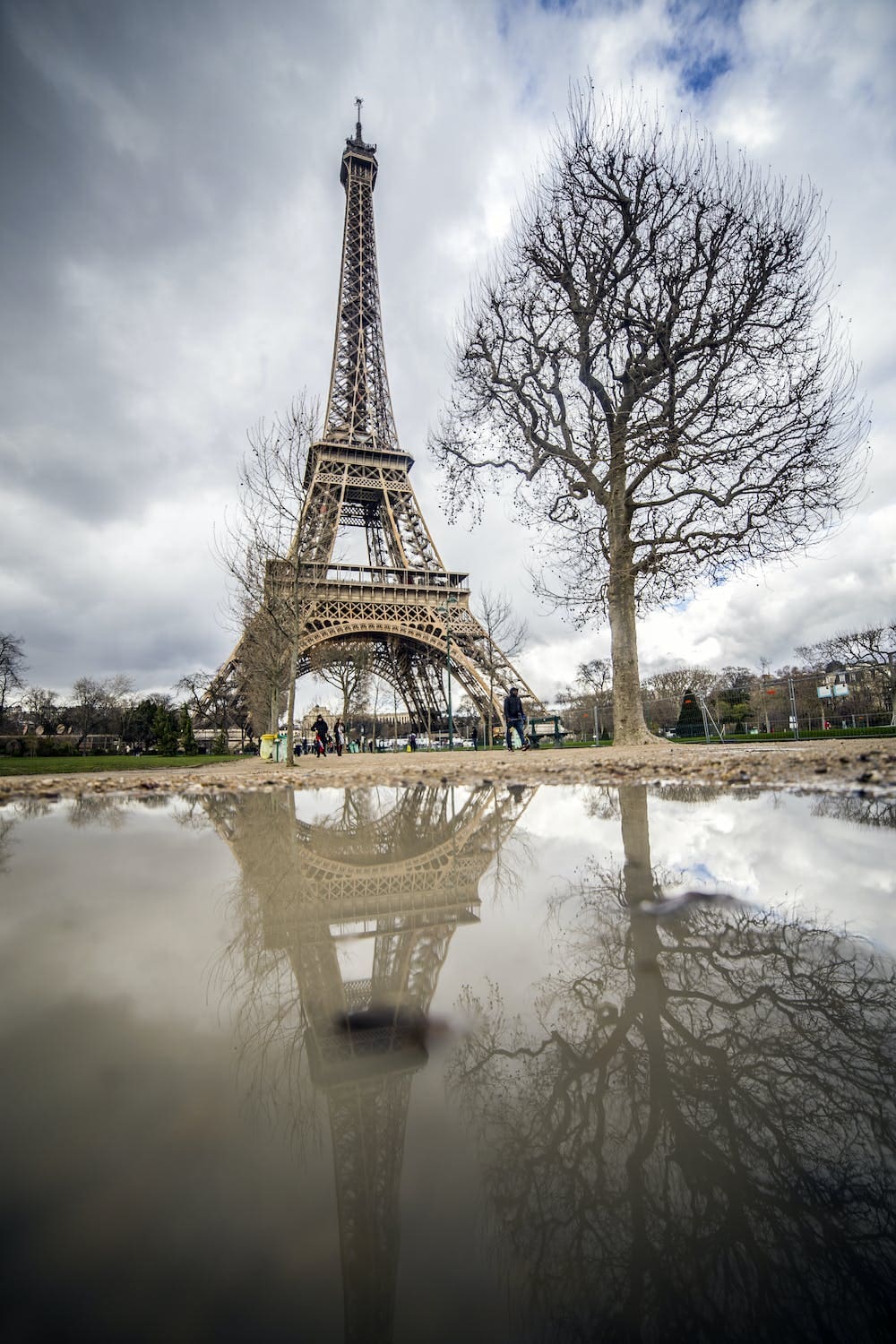
Photo by Tomas Anunziata from Pexels
Qu’est-ce que vous faites?
Pouvez-vous m’appeler un taxi, s’il vous plaît.
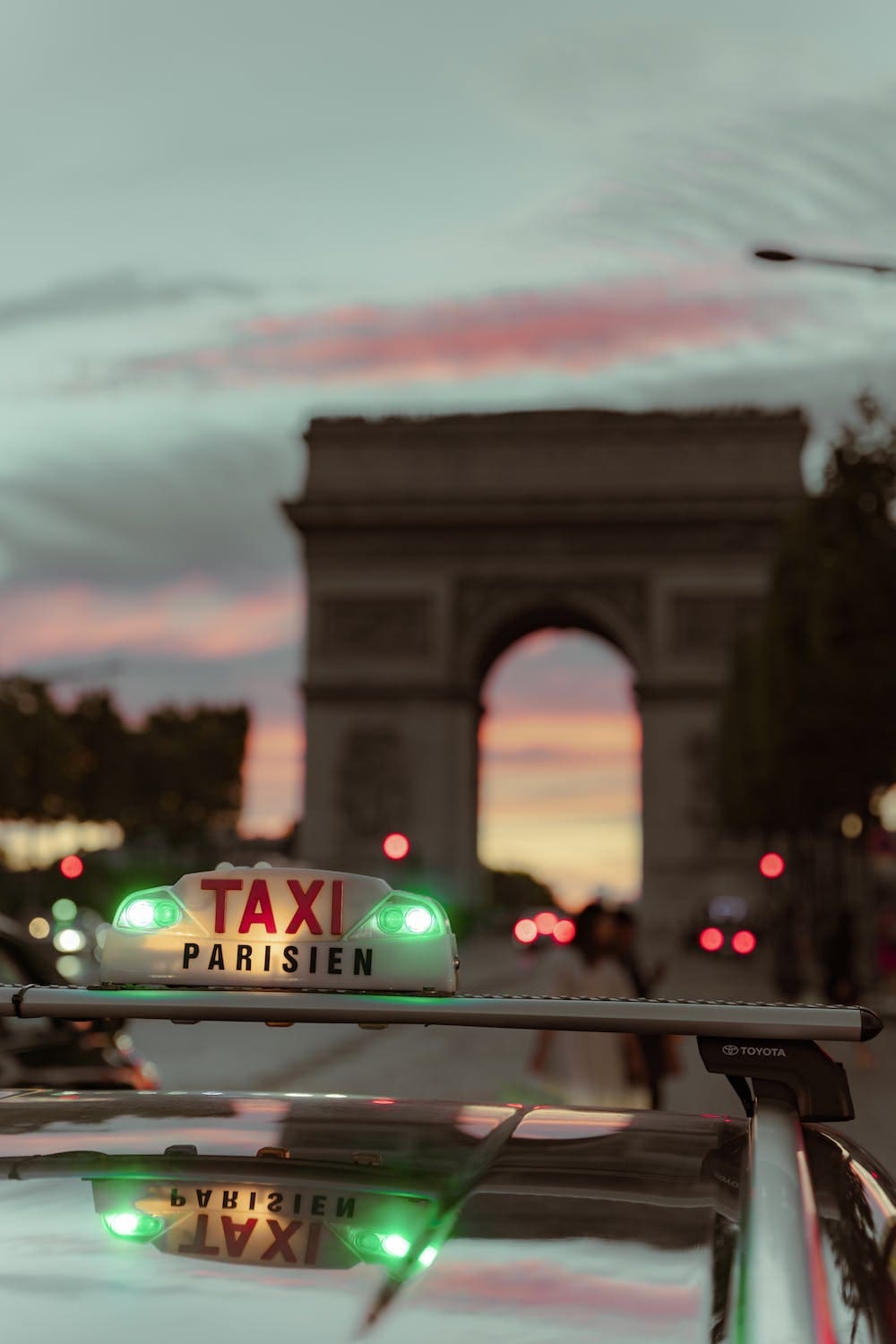
Photo by Jean-Baptiste Terrazzoni from Pexels
Est-ce que vous avez visité…?
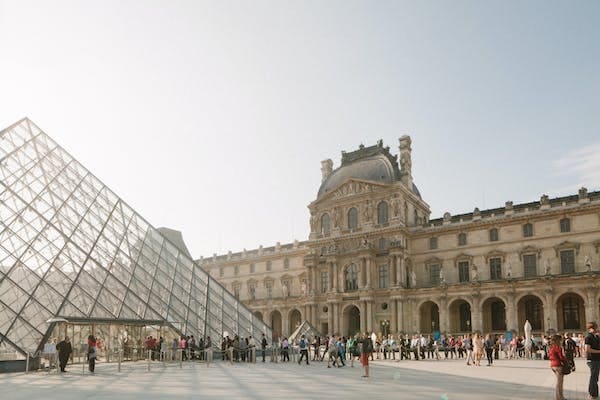
Photo by Lina Kivaka from Pexels
À quelle heure est-ce que cela ferme?
Planning a trip to Paris ? Get ready !
These are Amazon’s best-selling travel products that you may need for coming to Paris.
- The best travel book : Rick Steves – Paris 2023 – Learn more here
- Fodor’s Paris 2024 – Learn more here
Travel Gear
- Venture Pal Lightweight Backpack – Learn more here
- Samsonite Winfield 2 28″ Luggage – Learn more here
- Swig Savvy’s Stainless Steel Insulated Water Bottle – Learn more here
Check Amazon’s best-seller list for the most popular travel accessories. We sometimes read this list just to find out what new travel products people are buying.
Anna was born and raised in Paris. She studied Languages in Paris and Social Communication in Lisbon. Anna also lived in Madrid for a year. She has been to many places and hopes to go places. Wherever she goes, she always tries to experience each city as locals do. Anna usually has croissants for breakfast in Paris, takes a walk in Camden Town in London, eats lunch in Chiado in Lisbon, and enjoys Madrid's nightlife.
Hello & Welcome
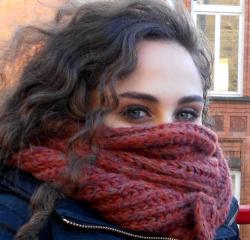
Free walking tours in Paris
Top 5 Tours & Sightseeing in Paris
- Tickets for Louvre Museum
- Musée d'Orsay Reserved Access
- Free Montmartre Tour
- Guided Tour of the Eiffel Tower + Summit access
- Arc de Triomphe: Skip The Line + Rooftop Access
with GetYourGuide and Tiqets
Popular Articles

Top 20 Streets to See in Paris

Paris in two days

Top 15 Things to do Around the Eiffel Tower

The Best Way to Visit Paris Museums

Top 15 Fashion Stores in Le Marais
Visit europe with discover walks.
- Paris walking tours
- Montmartre walking tour
- Lisbon walking tours
- Prague walking tours
- Barcelona walking tours
- Private tours in Europe
- Privacy policy
© 2024 Charing Cross Corporation

- Visiting Paris
Magical French Phrases For Your Next Trip to Paris
- By Laura Moore
- on May 28, 2019
Most Paris guidebooks will teach you basic French phrases such as “Parlez-vous anglais?” and “Où est le métro?” While these are certainly handy to know, I’ve begun to notice a pattern in the questions I get about French from the people on my tours. In particular, there’s a few things that I get asked about time and time again, so clearly Google Translate is going awry somewhere along the line. To help bridge the gap, I’ve listed below some of the magical French phrases I’ve discovered over the years that will help ease the way during your time in Paris, and have you sounding like a local in no time.
Bonjour/Bonsoir
I can’t overstate how essential it is to not just know these two words, but to understand why they are important. In French culture, it is imperative that you formally greet everyone. To do otherwise is considered to be the height of rudeness, and therefore you have to start every interaction with “Bonjour” during the day or “Bonsoir” in the evening. Entering a store? Look the clerk in the eye and say “Bonjour”. Asking for directions? Start with “Bonjour” before launching into your question. Going out to a restaurant? Greet the host before asking for a table. Even if they are the only two words you know in French, “Bonjour” and “Bonsoir” will get you very far in this country.
If you plan on riding the Metro in Paris, inevitably you will find yourself on an overcrowded train facing the intimidating prospect of pushing through several dozen people to make your exit. I don’t know why, but “Pardon” is the magical word that will make Parisians part like the Red Sea. So forget what you’ve been taught at school and skip the “Excusez-moi”. “Pardon” is all you’ll need.
Une Carafe d’Eau
Have you ever eaten at a restaurant in Paris and wondered why the waiter keeps bringing you bottled water when all you really want is tap water? You’re not alone. It took me several months to figure out that the magical phrase that signals to the waiter that under no circumstances are you going to pay for an overpriced bottle of water is “une carafe d’eau”. Use this power wisely.
According to Google Translate, if you want a coffee with milk you should ask for a “café au lait”. Seems reasonable, but for some reason asking for this will sometimes get you a large bowl of milky coffee and an exorbitantly high check to boot. Once again, the magic words you need to signal to the waiter that you know your French is “café crème”. If you really want to go native, enjoy your coffee at the bar instead of getting it go. Always remember that drinks in France are meant to be savoured.
On that note, meals, much like drinks, are meant to be enjoyed, and they are not a rushed affair in France. This means that at restaurants you will have to ask for your bill or it will never come. And it certainly won’t come mere minutes after digging into your meal like in North America. Therefore, when you’re ready to leave, go for a simple “L’addition s’il vous plaît” and you’ll be on your way in no time.
If you’re out shopping and a price tag is nowhere to be found, take my advice and don’t overcomplicate things with “Combien ça coute” or “Quel est la prix?” All you need is a simple “Combien?” to find out how much your newfound treasure will set you back. It’s really that easy.
La Même Chose
This is a slightly more unorthodox phrase, but it helped me survive my first month in Paris when my knowledge of French was less than this list. Directly translated it means “the same thing”, and therefore whenever I was in a bar, restaurant, or shop, and I saw someone else purchasing the meal/drink/item that I wanted, I would simply point, smile, and say, “La même chose s’il vous plaît”. It’s not particularly elegant, but it works, and it’s unusual enough that I would often get a nod of approval for my effort in speaking French. Give it try and let me know how it goes.
French is a truly beautiful language, but it is not one that can be mastered overnight. So if you’re travelling to Paris in the future and you’re not fluent just yet, don’t stress. These magical French phrases will get you started, and when in doubt, just remember that a smile is universal. Good luck!
_______________________________________________________________
Laura Moore is a professional storyteller who loves history and the many stories that make Paris one of the most fascinating cities in the world. Join one of her signature tours to learn the story of a city.
RELATED ARTICLES

Looking Forward and Back with Story of a City
I launched Story of a City on September 6th, 2018. My goal was to write about all things Paris. What to see. What to do.

Celebrating the Holidays at Vaux-Le-Vicomte
I love holiday traditions. I’m one of those people who will happily watch the same movie, eat the same food, and do the same activities,

20e Arrondissement of Paris – Ménilmontant
We have finally made it to the last stop of our tour of the arrondissements! This tour first kicked off in January with a look
Subscribe to our newsletter to have stories delivered directly to your inbox
© 2023 Story of a City All Rights Reserved
Privacy Policy
- Write for us
- Privacy Policy
- Terms and Conditions

Learn 150+ Basic French Travel Phrases To Master For Your Next Trip To France
- Post author: Elijah Logan
- Post last modified: April 11, 2023
- Post category: French Vocabulary / Popular Reviews

If you want to explore France thoroughly, especially the city of love, you must know the basic French travel phrases.
Although English is a universal language, it is not well-known in most French-speaking countries. Thus, to get around, you need to learn how to speak basic French.
Traveling to any place where you do not speak the native can be frustrating, especially steering your way while exploring.
So, to ensure you get around different French destinations quickly, you need to learn some essential travel French phrases. Even basic French knowledge can help you interact with locals and learn about the regular lifestyle.
Keeping this in mind, today, I bring you 150+ basic French words and phrases for travel to ensure your next trip to France is unforgettable.
Table of Contents
Basic French Words For Travel In France: Learn Useful French Phrases
Traveling is not only about moving from one place to another. There are a lot of aspects connected to this journey.
While traveling to an unknown place, you are bound to meet new people, interact with strangers, ask for their assistance when lost, go dining, shop, & more.
All these activities do not seem much of a task when you are in a place where you can easily interact with others.
However, in an unknown land, all these tasks seem like dreadful things that may even prompt you to never leave your accommodation in French.
But that is not why you or anyone would fly out for miles to the country of love, France. Exploring another country is a once in a lifetime opportunity. Thus, you need to make the most out of your visit.
And to help you with this, below I have a list of over one hundred & fifty common French phrases & words categorized as per various activities you will enjoy there. So let us begin and start our learning before that trip of yours.
26 Basic Conversational French Phrases
You can never go by in a foreign land if you can not speak even the bare minimum of the native language.
You do not need to be a pro in the French language. But you should at least know the words & phrases used the most in everyday conversations by natives.
Below is a list of some essential words & expressions that you will often use during your travel time in France.
Knowing these everyday phrases will help you interact with natives in a comfortable & sophisticated manner.
- Hello / Good Morning- Bonjour !
- Good Evening- Bonsoir !
- Hi (Informal)- Salut !
- Nice To Meet You- Enchanté!
- Welcome- Bienvenue!
- Yes / No- Oui / Non .
- How Are You?-Çava?
- I’mWell.- Je vais bien.
- How’s It Going?-Ça roule?
- I Am Well, And You?-Je vais bien, et vous?
- Do You Speak English?-Parlez-vous anglais?
- I Do Not Speak French.-Je ne parle pas français.
- I Don’t Understand.- Je ne comprends pas.
- Where Are You From?-D’où venez-vous?
- I Am From …- Je suis de …
- What Is Your Name?-Quel est votre nom?
- My Name Is…- Je m’appelle …
- Mrs. / Mr. / Miss- Madame / Monsieur / Mademoiselle
- Cheers!-Santé!
- I Don’t Know- Je ne sais pas.
- Thank You Very Much.- Merci beaucoup!
- You’re Welcome- De rien!
- Excuse Me / Sorry- Excusez-moi/Pardon !
- Sorry- Je suis désolé (e).
- See You Later!- À tout à l’heure!
- Goodbye- Au revoir!
29 Basic French Travel Phrases For Directions: Beautiful French Language
Getting lost in a new city or country is a thing that most people can relate to. I remember my first trip to Paris. I was so engrossed in exploring the architectural beauty around me that I got separated from my travel group.
I freaked out and was on the verge of crying. I only knew the name of the hotel I was staying at and some French phrases I had learned.
Suggestion: 100+ Tasty Vegetables In French To Make Your Vocab More Yummy . (adsbygoogle = window.adsbygoogle || []).push({});
I asked a passerbys the directions for the hotel by saying “Quelle est la direction de l’hôtel Wallace, s’il vous plaît ?” (What is the direction of the Wallace Hotel, please?) and thus reached there safely.
Although I spent the rest of my day in my room. I was glad that at least I could find my way back. It all happened because I knew how to ask for directions in French. Knowing the essential phrases for directions can save you from the panic of getting lost.
Memorize the below-mentioned basic French phrases for directions to ensure you do not get panics like I did.
- Directions- Les directions
- North- Nord
- East- L’est
- West- L’ouest
- There- Là-Bas
- Where Is … Please?- Où est… ,s’il vous plaît?
- I’mLost.- Je suis perdu(e).
- Is It Far?- Est-ce que c’est loin?
- Is It Close?- Est-ce que c’est proche?
- Which Way?- Par où?
- It’s To The Right / Left.- C’est à droite / à gauche.
- Turn Right.- Tournez à droite.
- Turn Left.- Tournez à gauche.
- Straight Ahead.- Tout droit.
- Over There.-Là-Bas.
- Where Are We?-Où sommes-nous?
- Can You Help Me? -Pouvez-vous m’aider?
- To The Left- À gauche.
- To The Right- À droite.
- Straight Ahead- Tout droit.
- Is It Far/Close By?- C’est loin?/C’est près d’ici?
- The Exit- La sortie
- It’s To The Left- C’est à gauche.
- It’s To The Right- C’est à droite.
- It’s Straight Ahead- C’est tout droit.
27 Basic French Words & Phrases For Transportation
The French transportation system is among the best in the world. Although no country can touch Japan regarding convenient public transportation, France also offers an excellent system.
You will most likely take trains and buses to get around the country. They are an affordable means of transportation and can help you save a lot on your travel.
With a readily available transit system, you will face no problem traveling from one place to another. Transportation prices vary over distances which is not too much.
To get your way through the various modes of transportation, there are some essential words & phrases that you should learn in French.
- Transportation- Le transport
- The Bus- Le bus
- Bus Stop- L’arrêt de bus
- A Taxi- Un taxi
- Train- Le train
- Subway- Le métro
- Airplane- Un avion
- Car- Une voiture
- Ticket- Un billet
- Ticket Window- Le guichet
- Airport- L’aéroport
- Bus/ Train Station- La gare
- Early- En avance
- On Time- À l’heure
- Delayed- En retard
- Cancelled- Annulé
- Do Not Enter.-Entrée interdite.
- Exit- La sortie.
- Validate Your Ticket.-Valider votre billet.
- What Is The Schedule?- Quelle est le planning?
- What Is The Price Of A Ticket?- Quel est le prix d’un ticket?
- Where Is The Ticket Window?-Où est Le guichet?
- I Would Like To Purchase A One-Way Ticket.- Je voudrais acheter un billet aller simple.
- I Would Like To Purchase A Return Ticket.- Je voudrais acheter un billet aller-retour.
- Have A Nice Trip!- Bon voyage!
- I Would Like To Go To The Bus/Train Station- Je voudrais aller à la Gare.
5 Essential French Phrases For Clarification
There will be times during your trip to France when you might have to interact with locals. It can be for everyday greetings in French or you asking for some assistance.
Under any scenario, French people are pleased to see a foreigner speaking their language. This is why sometimes they get over-enthusiastic, making it hard for the other person to follow their complex conversations.
Similar Post: Mastering the Art of Asking ‘What’: Easy Ways to Improve Your French Vocabulary.
I once met this lady to whom I asked to click my picture. As I requested in French, she was happy, and after clicking my picture, we had a great conversation.
Although I could understand her reasons, it got hard for me as she started talking fast and using more extensive sentences.
I had to tell her to slow down so that I could understand what she was saying. She understood and was kind enough to do so.
So, if you can tell others that you are unable to understand them or ask them to repeat in their native language, French people will be more than happy to make things easier for you.
- I Don’t Understand- Je ne comprends pas.
- Could You Repeat That, Please?-Pouvez-vous répéter, s’il vous plaît?
- Speak A Little Slower, Please- Parlez plus lentement, s’il vous plaît!
- Could You Speak More Slowly Please?-Pourriez-vous parler plus Lentement?
- Could You Write That Down For Me, Please?- Pourriez-Vous L’écrire, S’il Vous Plaît?
- Speak Slowly, Please.-Parlez Lentement, S’il vous plaît.
- Repeat, Please.- Répétez, S’il vous plaît.
25 Basic French Phrases For Shopping & Money: Know The Easy Words To Use
France is the land of high-end fashion & lifestyle. You can see several beautiful boutiques nationwide that will tempt you to shop.
To ensure you can ask, bargain, and buy anything you want, you must learn the essential words & phrases related to shopping & money in French.
Knowing the standard terms will ensure you do not get scammed and overpay for something worth pennies.
- How Much Is This?- Combien Ça Coûte?
- It’s Too Big / Small.- C’est Trop Grand / Petit.
- I’m Just Looking Around, Thanks.-Je Regarde Juste Autour De Moi, Merci.
- I Would Like … Please.- Je Voudrais … S’il vous plaît.
- Good Quality!- Bonne Qualité!
- I Need …- J’ai besoin de …
- I Want …- Je veux …
- I’m Looking For …- Je cherche …
- Can I Try This On?- Je peux l’essayer?
- Is It On Sale?-C’est en solde?
- No Thanks, I’m Only Looking.-Non Merci, Je Ne Fais Que Regarder.
- No, I’m [Just] looking For the Moment.-Non, Je Regarde Pour L’instant.
- I Would Like To Pay In Cash- Je Voudrais Payer En Liquide/Espèces
- Do You Accept Foreign Cards?-Est-Ce Que Vous Acceptez Les Cartes Étrangères?
- Can I Pay With A Credit Card?-Est-Ce Que Je Peux Payer Avec Une Carte De Crédit?
- Can I Order This On The Internet?-Puis-Je Commander Cela Sur internet?
- Where Are The Shops?-OùSont Les Magasins?
- Where Is The Mall?-Où Est Le Centre Commercial?
- What Time Does It Close?-À Quelle Heure Est-Ce Que Cela Ferme?
- What Time Does It Open?-À Quelle Heure Est-Ce Que Cela Ouvre?
- I Am Searching For A Bag/A Postcard/A Book- Je Cherche Un Sac/Une Carte Postale/Un Livre.
- The Bank- La Banque
- Notes- Billet D’argent
- Coins- La Monnaie
- How Much Does It Cost?-Combien Ça Coûte?
- It’s Too Expensive!- C’est Trop Cher
- It’s A Great Deal!- C’est Bon Marché!
- How Much Do I Owe You?- Je Vous Dois Combien?
28 Basic French Phrases For Assistance/Help/Instruction
You will find yourself in need of help when in a foreign land. It can be for clicking a picture, finding a bathroom, a tourist site, a restaurant, police assistance, and more.
Under any emergency situation, you can only rely on the people around you. And for them to understand you, you need to speak their language.
Related: The Ultimate Guide to Saying Good Luck in French: Tips and Phrases You Need to Know.
It is not possible to master a new language in a matter of weeks. But you sure can learn some French phrases that can help you ask for instructions and help from others.
- Airport- L’aéroport
- Grocery Store- L’épicerie
- Coffee Shop- Le Café
- Metro Station- La Station De Métro
- Bus Station- La Gare Routière
- Park- Le Parc
- Beach- La Plage
- Can You Help Me?-Pouvez-Vous M’aider ?
- Can You Take Our Photo?-Pouvez-Vous Nous Prendre En Photo ?
- I Don’t Understand.- Je Ne Comprends Pas.
- Where Is The Bathroom/Restroom?-Où Sont Les Toilettes ?
- Where Is …?- Où Est ___ ?
- Je Cherche…- I’m Looking For…
- Where Is The Hospital/ The Pharmacy?-Où Est L’hôpital/ La Pharmacie?
- Help Me – Aidez-Moi!
- I’mLost – Je Suis Perdu.
- I’ve Lost..- J’ai Perdu …
- I’ve Lost My Wallet- J’ai Perdu Mon Porte-Monnaie.
- I Feel Sick – Je ne me sens pas bien.
- Call An Ambulance – Appelez Une Ambulance.
- Call The Police – Appelez La Police.
- I Have A Problem – J’ai Un Problème.
- I Have A Question – J’ai Une Question.
- Could You…- Pourriez-Vous …
- Are You Able To Take My Photo/Our Photo?-Pourriez-Vous me/nous Prendre en Photo?
- Is there A Good Restaurant/A Good Café near by- Y a-t-il un bon restaurant/un bon café à proximité?
- Où Est La Plage/Le Centre-Ville?(Where Is The Beach/City Center.)
- I Am Searching For the Hotel/Hospital/Bank- Je Cherche L’hôtel/L’hôpital/La Banque.
31 Basic French Words & Phrases For Dining
Food is an integral part of our lives. It is one of the best things to explore when in France. Fine dining & delicious food are the highlights of French traveling. You get to experience the elegance & taste France has to offer.
Don’t Miss To Checkout: 10 Common Ways to Say “I Don’t Know” in The French Language With Examples.
By knowing some essential dining words & phrases, you can avoid causing any blunders and easily order the things you want to relish.
- Waiter – Monsieur/Madame
- Menu- Le Menu
- Bread- Le Pain
- Cheese- Un Fromage
- Meat- La Viande
- I Would Like A Coffee.- Je Voudrais Un Café.
- I Would Like A Beer.- Je Voudrais Une bière.
- I Would Like Some Water.- Je Voudrais De L’eau.
- I Would Like A Baguette – Je Voudrais Une Baguette
- I Would Like Some Water – Je Voudrais De L’eau
- I Would Like The Bill – Je Voudrais L’addition
- Can I Have The Bill, Please?-L’addition, S’il Vous Plaît.
- A Glass Of Wine. – Un Verre De Vin.
- I Would Like…- Je Voudrais…
- I’ll Have – Je Prendrai
- Do You Have…?- Avez-Vous…?
- Appetizers- Les Entrées
- Main Courses- Les Plats principaux
- Desserts- Les Desserts
- Vegetarian Options- Options Végétariennes
- I’m Full- Je Suis Repu(e)
- This Is Delicious!-C’est Délicieux!
- A Table For 4, Please.- Une Table Pour 4, S’il Vous Plaît.
- The Menu, Please.- Le Menu, S’il Vous Plaît.
- The Wine Menu, Please.- La Carte Des Vins, S’il Vous Plaît.
- Is The Tip Included?- Est-Ce Que Le Service Est Compris?
- This Is So Good!-C’est Trop Bon!
- I Ate Well/I’m Full- J’ai Bien Mangé
- I’m Satisfied- Je Suis Répu/Repue
- What Are Today’s Specials?- Quels Sont Les Plats Du Jour ?
- I’mAllergic To…- Je Suis Allergique À …
11 Basic Phrases To Rock In The Club That You Can Easily Use
No trip to France is complete until you explore the night & party life of the country. Night clubs are trendy among the young generation. You can start with some drinks and sway your body to the upbeat music.
But to ensure you do not enter into any problems & can express yourself better, memorize some helpful French phrases below.
- Want To Go Get A Drink Tonight? – Ça Te Dit D’aller Boire Un Verre Ce Soir?
- I Want To Party! – J’ai Envie De Faire La Fête!
- Let’s Sit Over There?- On S’installe Là-Bas?
- We’ll Take The Bottle- On Va Prendre La Bouteille.
- We’re Taking Shots!- On Prend Des Shooters!
- I Would Like A Glass Of Wine – Je Voudrais Un Verre De Vin.
- Let’s Dance! – Dansons!
- I’m Spent, I’m Leaving- Je Suis Crevé/Crevée, je pars.
- Get Home Safely!- Rentrez-Bien!
- I Really Enjoyed Myself- Je Me Suis Vraiment Bien Amusé/Amusée.
20 Basic Drink Words in French: Talking About Drinks In Restaurants
Drinking is an integral part of French dining culture. As we like to have a glass of water beside our food, the French love to have an extra glass for their liquors, wine, & cocktails.
French restaurants are extravagant with their drinks. You can order anything from coffee to alcohol to enjoy your dining experience.
To order what you want, learn some most common drinks & related words in French:
- The Wine Menu, Please.- La Carte Des Vins, S’il Vous Plaît
- A Glass Of Wine- Un Verre De Vin
- Red Wine- Vin Rouge
- White Wine- Vin Blanc
- Tea- Du Thé
- A Coffee- Un Café
- A Beer- Une Bière
- Some Fruit Juice- Du Jus De Fruit
- Some Water- De L’eau
- Fizzy Drink- une Boisson Pétillante
Top FAQs About Common French Phrases In English
Are there any french slangs i should know.
YES. If you want to fit in the crowd and want locals to treat you like a fellow, you should learn some standard day phrases and slang that only locals use.
This way, you project to others that even though you are a foreigner, you are familiar with the country & its people.
Below are some French slangs or French travel phrases with pronunciation you can master for your trip:
- Hello- Salut (informal)!
- I love Paris- J’adore Paris.
- Have a nice trip- Bon voyage!
- Forget it or drop it- Laisse tomber.
- Come on or let’s go- Allez!
- That’s life- C’est la vie.
- Long live the Republic and long live France!-Vive la république et vive la France!
- French food is the best in the world- La cuisine Française est la meilleure du monde.
How to prepare well for traveling to France?
To ensure you have a great trip to the land of France, you can begin by looking for accommodations that are safe & as per your requirements.
Buy a French phrasebook for travelers. It will come in handy. You sure can learn different basic expressions, but a book can help you whenever you feel stuck.
Also, research the local customs & lifestyle to blend in easily without getting shocked in front of the locals.
Lastly, plan all the activities & site-seeing beforehand to ensure you do not waste any time & extra money.
What are the best places to visit in France?
France is the ultimate vacation destination. This land of romance has wonderful places & activities for you to explore.
Some of the most popular destinations that you cannot miss in France are:
- The Eiffel Tower- La tour Eiffel
- Bordeaux- Bordeaux
- Louvre Museum- Le Musée du Louvre
- Notre-Dame De Paris Cathedral- La Cathédrale Notre-Dame De Paris
- Saint-Tropex Beach- La plage de Saint-Tropez
What are the basic greetings that every tourist should know in France?
If you want to go by with ease while exploring France and its beautiful cities, you need to learn some expressions, especially for greetings.
You will be able to make a good impression on others and get their attention with the least effort.
- Bonjour! – Hello/Good day!
- Salut! – Hi/Bye!
- Bonsoir! – Good evening!
- Au revoir! – Goodbye!
- Coucou! – Hey there!
- Allô? ( – Hello?
- À plus! – See you later!
- À tout à l’heure! – See you soon/See you in a while!
There are several other phrases than saying good morning in French, but if you are not eager to dive in deeper, these few are more than enough.
What is the greeting etiquette of French people?
Like any other country, when you meet people in France, you have to shake hands with everyone present, whether arriving or leaving.
If you are among close friends, family & relatives, the most common greeting is a kiss on both cheeks, also known as “la bise.”
The ‘la bise’ is not actually kissing other people. People simply place one’s cheek against the other’s, make a kissing noise, and then repeat it on the opposite side.
If you see two people greeting each other in a ‘la bise’ way, you can quickly tell they are close.
By learning over 150+ basic French travel phrases, you can ensure you have an unforgettable travel experience in France.
Learning the language can help you with easy exploration, dining, sightseeing, interacting with natives, shopping & more.
The more familiar you are with everyday words, phrases, & slang, the less likely you are to get scammed in the country of love.
You Might Also Like

Colors In French: A Fun And Easy Learning Guide For Students

Learn How Do You Say I Miss You in French with Examples

Explore 70+ Easy French Vocabulary To Use At The Airport – A Beginner Guide
Leave a reply cancel reply.
Save my name, email, and website in this browser for the next time I comment.
This site uses Akismet to reduce spam. Learn how your comment data is processed .

Language in Paris: Everything you need to know
Whether you’re planning a trip to the City of Light or you’re simply curious about the language spoken in one of the most popular tourist destinations in the world, it’s helpful to use some simple French language in Paris.
The French language is beautiful and some basic phrases can help you whether you are checking in to a hotel, eating at a restaurant, using public transport or seeking help during your trip to Paris.
Table of Contents
What Are The Top Languages Spoken In Paris
The official language of France is French, of course. However, you’ll find that a number of other languages are spoken throughout the city. According to a 2013 study, these are the most common languages spoken in Paris:
– French: 82.2%
– Arabic: 2.4%
– Portuguese: 1%
What About Other Languages Spoken In Paris
In addition to French and English, you’ll find that a number of other languages are spoken throughout the city. Some of the most common include:
– Spanish: 1.8%
– Italian: 1.4%
– German: 1%
Do People In Paris Speak English
You may be relieved to know that English is actually the most commonly spoken language among foreign language speakers in Paris. In fact, a whopping 37% of people in Paris report speaking English as their second language.
This means that you’ll have no trouble finding someone who can help you with directions or answer any questions you may have during your stay in the city.
It is also acceptable to post letters , parcel and other mail items address in English.
Can You Get Around Paris Without Speaking French
While it’s certainly helpful to know some French when visiting Paris , it’s not absolutely necessary.
Thanks to the large number of people who speak English, you should be able to get by without speaking a word of French.
Of course, learning even a few basic phrases will help you make the most of your experience in the city.
And who knows, you may even find yourself picking up a few words of French along the way.
Common French Phrases to use in Paris
Here are a few essential French phrases that will come in handy during your first (or hundredth) time in Paris:
– Bonjour (hello)
– Au revoir (goodbye)
– S’il vous plaît (please)
– Merci (thank you)
– Oui (yes)
– Pardon (excuse me/sorry)
With these key phrases in your repertoire, you’ll be able to navigate your way around Paris with ease. Bon voyage!

French Phrases to use in the Restaurant
If you’re planning on dining out in Paris, it’s helpful to know a few key French phrases that will come in handy in the restaurant. Here are a few of the most useful:
– Je voudrais une table pour deux, s’il vous plaît (I would like a table for two, please)
– Le menu, s’il vous plaît (The menu, please)
– Je prendrai… (I’ll have…)
– Merci beaucoup (Thank you very much)
– Bon appétit! (Enjoy your meal!)
French phrases to use on public transport
Getting around Paris is easy with the city’s efficient public transport system. If you’re planning on using buses, trams or the metro, here are a few key French phrases that will come in handy:
– Où est…? (Where is…?)
– Un ticket pour…, s’il vous plaît (One ticket to…, please)
– La prochaine station, s’il vous plaît? (The next stop, please?)
– Merci (Thank you)
French Phrases to use when you need help
If you find yourself in need of assistance during your time in Paris , here are a few key French phrases that will come in handy:
– J’ai besoin d’aide, s’il vous plaît (I need help, please)
– Où est le toilette? (Where is the toilet?)
– Je cherche… (I’m looking for…)
– Pouvez-vous m’aider, s’il vous plaît? (Can you help me, please?)
French phrases to use at a hotel
If you’re planning on staying in a hotel during your time in Paris, it’s helpful to know a few key French phrases that will come in handy. Here are a few of the most useful:
– Je voudrais une chambre pour deux personnes, s’il vous plaît (I would like a room for two people, please)
– Je voudrais une chambre avec une douche, s’il vous plaît (I would like a room with a shower, please)
– Combien coûte une nuit? (How much does a night cost?)
– Je reste pour…nuits (I will stay for…nights)
Language in Paris when in a taxi
If you’re planning on taking a taxi during your time in Paris, it’s helpful to know a few key French phrases that will come in handy. Here are a few of the most useful:
– Combien coûte la course jusqu’à…? (How much does the ride to…cost?)
– S’il vous plaît, prenez-moi à… (Please take me to…)
Language in Paris when shopping
If you’re planning on doing some shopping during your time in Paris, it’s helpful to know a few key French phrases that will come in handy. Here are a few of the most useful:
– Combien coûte ce…? (How much does this…cost?)
– Je voudrais payer par carte de crédit, s’il vous plaît (I would like to pay by credit card, please)
Language in Paris when at the bank
If you need to visit a bank during your time in Paris, it’s helpful to know a few key French phrases that will come in handy. Here are a few of the most useful:
– J’ai besoin de… (I need…)
– Combien coûte…? (How much does…cost?)
– Je voudrais retirer de l’argent, s’il vous plaît (I would like to withdraw money, please)
Days of the week in French
Monday: lundi
Tuesday: mardi
Wednesday: mercredi
Thursday: jeudi
Friday: vendredi
Saturday: samedi
Sunday: dimanche
Months of the year in French
January: janvier
February: février
March: mars
April: avril
July: juillet
August: août
September: septembre
October: octobre
November: novembre
December: décembre
Numbers in French
It’s also helpful to know a few key numbers in French. After all, you’ll need to be able to tell your taxi driver how many people are in your party or ask the waiter for the check at the end of your meal.
Here are a few essential French numbers that you should know:
– 3 (trois)
– 4 (quatre)
Here are a few key language tips to keep in mind when speaking French in Paris:
– The French language has many different dialects, but the most commonly spoken form in Paris is known as Parisian French.
This dialect is characterized by a more clipped pronunciation and certain slang words and expressions that you may not be familiar with.
– In addition to French, you’ll also hear a lot of other languages spoken in Paris, including English, Spanish, Arabic, and Chinese.
Many people in the city are multilingual, so don’t be surprised if you hear several languages being spoken at the same time.
– When speaking French in Paris, it’s important to be polite and respectful.
This includes using formal language when speaking to strangers or people in positions of authority, such as police officers, store clerks, and waiters.
– Parisians are known for being fashion-conscious, so it’s important to dress well when speaking to them.
This doesn’t mean that you need to be wearing the latest designer clothes, but you should make an effort to look presentable and put-together.
– If you’re not sure how to say something in French, don’t be afraid to ask for help.
Many people in Paris are happy to help tourists with their language skills, and they’ll appreciate your efforts to speak their language.
Popular French Courses in Paris
Whether you’re a beginner or an advanced French speaker, there’s a language course in Paris that’s perfect for you. Here are a few of the most popular courses:
– The Alliance Française de Paris offers language courses for all levels, from beginners to advanced.
They also offer specialized courses for business French and preparation for the DELF/DALF exams.
– The Paris Language Institute offers language courses for all levels, as well as business French and DELF/DALF exam preparation.
– The Sorbonne University offers language courses for all levels, with a focus on literature and culture. They also offer business French and DELF/DALF exam preparation.
– The Institut Catholique de Paris offers language courses for all levels, with a focus on Catholic culture and history. They also offer business French and DELF/DALF exam preparation.
No matter what your level of French is, there’s a language course in Paris that’s perfect for you
Wrap Up: Language in Paris
Learning even a few basic French phrases will go a long way towards making your time in Paris more enjoyable.
With a little practice, you’ll be speaking like a native in no time!
FAQs: Language in Paris
What is the most commonly spoken language in paris.
The most commonly spoken language in Paris is French, but you’ll also hear other languages such as English, Spanish, Arabic, and Chinese.
Do I need to speak French to visit Paris?
No, you don’t need to speak French to visit Paris, but it’s helpful to know a few basic phrases. Many people in the city are multilingual, so you can get by speaking English in most situations.
What are some helpful French phrases for visitors to Paris?
Some helpful French phrases for visitors to Paris include : J’ai besoin de… (I need…) Où est…? (Where is…?) Merci beaucoup (Thank you very much)
What is the Parisian dialect of French?
The Parisian dialect of French is characterized by a more clipped pronunciation and certain slang words and expressions that you may not be familiar with.
Related Posts:
Visiting Paris for the first time The Ultimate Guide to the 11 Top Things to Do in Paris How to spend one day in Paris: The best 24 hour Paris Itinerary How to spend 3 days in Paris: The Perfect Paris Itinerary
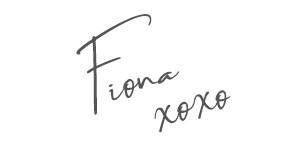
I'm Fiona, the Australian blogger behind Travelling Thirties. Travel has always been my passion since 2007. I created this site to help inspire you to travel the world. In 2010 I moved from Australia to Scotland with $500 and a one way ticket, no one thought I'd last 5 minutes but I lasted 5 years. I share everything from one day itineraries to travel tips and tricks from Australia to Europe that will inspire you to get out and travel. Some of my favourite countries I have been to are France, Finland, Denmark, and England.
Travel Expertise: Europe Travel, France Travel, Christmas Markets, travel planning, itineraries and travel tips
Similar Posts

The 12 Best Free travel apps for your next trip
These days there are apps for just about everything but half of them are worthless and take up important storage on your device. Travel apps can make your travelling so much better if you make sure you have downloaded a few great travel apps. Are you planning a trip? Check out these posts to help…

What are people from Denmark Called?
If you’re looking for a place that has it all – beautiful scenery, interesting history, and a thriving culture – look no further than Denmark. This Scandinavian country in Northern Europe is home to more than 5.5 million people, making it the most populous in the Nordic region. While Denmark is a relatively small country,…
The Ultimate Guide to the Top Things to Do in Malmö (2023)
Stockholm, Copenhagen are places we have all heard of before and these are the places that draw in thousands of tourists every year. What about Copenhagen’s smaller neighbour Malmö? Have you heard of Malmö before? There a things to do in Malmö? Scandinavia is full of smaller cities and towns that also pack quite a…

21 Perfect Weekend Getaways from Paris
There’s no doubt about it, Paris is one of the most beautiful, romantic and inspiring cities in the world. But sometimes, even the most die-hard city-slickers need to get away from the hustle and bustle for a weekend of rest and relaxation. Luckily, Paris is perfectly placed for some amazing weekend getaways. Here are 37…

Where is Paris: A guide to the Latitude of Paris
Paris is located at latitude 48.856614, making it one of the northernmost cities in Europe. Paris’ latitude helps give the city its mild climate, which is perfect for spending time outdoors exploring all the city has to offer. From strolling along the tree-lined boulevards to picnicking in one of the many parks, there is always…
How to get from Copenhagen to Legoland: 4 Best Ways (2024)
If you’re looking for the best theme park in Denmark, Legoland is your destination. Just a short drive from Copenhagen, Legoland offers families a chance to enjoy rides, shows and attractions based on the popular LEGO building blocks. With something for everyone, Legoland is a great choice for a day out with the family. There…

Paris Travel Tips: 50 Important Things To Know Before Going To Paris
Are you planning a trip to the French capital? This post will give you all the useful Paris travel tips to make your trip fun and much easier.
Oh, Paris! The thought of walking through its beautiful streets , visiting its famous landmarks one after the other, tasting all its delicious foods , and finally climbing the Eiffel Tower , a trip to Paris is a dream come true!
If you’re planning a trip to Paris, it must be extremely exciting knowing that you’ll be in one of the most beautiful cities in the world.

Disclaimer: This post might contain affiliate links. This means we may earn a small commission (at no extra cost to you) should you choose to sign up for a program or make a purchase using one of our links. It’s okay – We love all of the products we recommend anyway, and you will too! Also, that commission helps us keep this awesome free blog up to date! You can read our full disclosure here for more details!
However, as you prepare for your visit, whether you’re going to Paris for the first time or have been there countless times, there are a number of Paris travel tips that will help you have a fun, safe, and seamless trip.
As someone who lives in the city, I’ve experienced Paris countless times and have found myself in various circumstances that have given me the immense experience to share practical tips for visiting Paris.
So, before you go, make sure that you read these Paris travel tips.
Before You Go, Here’s How to Plan Your Visit To Paris: Practical Quick Tips
WHERE TO STAY Best Eiffel Tower Views: Hôtel Le Walt (9.0) Luxury stay: Pullman Paris Tour Eiffel (8.2) Mid-range stay: Hôtel Eiffel (8.7) Budget Stay: People – Paris Bercy (8.9) Apartment Rental: Résidence Charles Floquet (9.1)
BEST GUIDED TOURS Louvre Museum guided tour : (4.5/5) Seine River Dinner Cruise : (4.7/5) Montmartre Walking Tour : (4.8/5) Le Marais Walking Food Tour : (4.5/5) Versailles Guided Tour : (4.8/5) Eiffel Tower Guided Tour : (4.4/5)
- Considering travel insurance for your trip? World Nomads offers coverage for more than 150 adventure activities as well as emergency medical, lost luggage, trip cancellation, and more.
- Prepare your trip extensively with this Paris Travel guidebook .
- Don’t forget a universal travel adapter , a travel neck pouch , and comfortable walking shoes .
- Consider getting either the museum pass or the Paris city pass if you plan to visit many attractions. The city pass comes with free transportation and access to the hop-on-hop-off bus. You can read my Paris museum pass review to see if it’s right for you.
- Book this private transfer from CDG airport to Paris to avoid the hustle of figuring out how to get to Paris.
Paris Travel Tips: Things To Know Before Visiting Paris
Whether it’s choosing the right time to visit, tips on navigating public transportation, how to dress in Paris, tips to fully get the most when visiting attractions, or mistakes to avoid, here are the best Paris tips for travelers.
For easy navigation, I’ll be categorizing this article into; general travel tips for Paris, money tips for visiting Paris, transportation travel tips for Paris, safety tips for traveling to Paris, and food & restaurant tips for Paris travelers. Now, let’s dive in.
General travel tips for Paris
1. choose the time to visit paris that is best for you.

The first thing to consider when planning a trip to Paris is to choose the best time to visit that works for you. There is no one answer that fits all as we all have different things going on in our lives.
But if you keep other factors constant and base your decision on what’s happening in Paris, or the weather, here is a brief to help you decide.
Paris in Spring is one of the best times to visit Paris. The temperatures are warm, the flowers are blooming and there are not huge crowds yet.
On the other hand, Paris in summer has the most pleasant weather (if there is no heat wave), and the days are long to enjoy the city to the max, however, it sees the biggest crowds of tourists and airplane fares, attractions, and hotels are at their highest.

For an in-between, opt to visit Paris in the fall . The weather is chilly, the streets are covered in fall colors, the crowds are reduced, especially towards the beginning of winter, and the general cost of travel starts to fall.
If you don’t want to deal with huge crowds, you can opt to visit Paris in winter . During this time, the crowds disappear, (though they creep back in during the Christmas season ), and the cost of flights and accommodation is lower, but you’ll have to brave the cold temperatures and short days.
I hope the breakdown of the season helps you choose but if personally I had to choose, I would say towards the end of spring and the beginning of fall are the best times to visit Paris.
The temperatures are still pretty warm, the crowds are not that much and the cost is not that high too.
2. Don’t Skimp on Travel Insurance
One of the best tips for traveling to Paris is not to forego travel Insurance. In fact, before traveling anywhere, whether it’s Paris or not, make sure that you have travel insurance.
So many things can happen on the road! You could lose your valuable travel accessories, you may need expensive urgent care, and if you don’t have travel insurance, it will get expensive pretty quickly yet insurance could have covered everything if you had spent just a few bucks on it.
Though there are countless travel insurance companies out there, the one I trust and recommend is World Nomads Travel insurance . They operate in over 130 countries, so it’s easy to request a quote and the claim process is not a rat race.
However, if you’re a digital nomad or a long-term traveler, you can also check out Safety Wings Travel insurance as they offer great deals for long-term travelers.
3. Don’t visit only the famous landmarks

It’s obvious the first places you’ll have on your Paris travel bucket list are the famous attractions like the Louvre Museum, the Eiffel Tower, the Sacre Coeur, the Arc de Triomphe, the Orsay Museum, and others.
Instead of just visiting only those ones, venture into other non-touristy things to do in Paris and go off the beaten path. This way, you’ll be able to explore Paris beyond what is in the guidebooks .
Some of the hidden gems of Paris worth checking out include parks like Parc Manceau, the covered passages of Paris , Les Arènes de Lutèce, the windmills in Montmartre , Paris Sewer Museum, Paris pet cemetery, and many others.
4. Buy skip-the-line tickets in advance to avoid wasting time in queues

One of the most useful tips when visiting Paris is to buy skip-the-line entry tickets to attractions in advance.
Paris is one of the most visited cities in Europe , so you can expect long queues at its popular attractions. At places like the Louvre, Eiffel Tower, or even Arc de Triomphe, you can easily spend 2-3 hours just in lines to access them.
While this may not be a big issue if you have a long time in the city, but if you’re visiting Paris for a weekend or even 1 day , you’ll lose so much time in queues instead of visiting other attractions.
The best way to avoid this is by purchasing skip-the-line tickets online. Some of the skip-the-line tickets you can buy in advance for popular attractions include;
- This Eiffel Tower skip-the-line ticket to the summit
- The Louvre museum skip-the-line ticket with an audio guide
- The Orsay museum skip-the-line ticket
- This Arc de Triomphe skip-the-line ticket
- Versailles Palace skip-the-line entry ticket to the palace and gardens
- And many others.
You can also check out my complete list of skip-the-line entry tickets to popular landmarks all in one place.
Pro tip* Instead of buying each individual ticket, you can choose to buy this Paris pass that will give you access to over 80 attractions for free while also skipping the long lines. Alternatively, if you intend to visit a number of museums, you’re better off buying this Paris museum pass . You can get more details about the museum pass by reading my detailed Paris museum pass review here .

5. Choose your accommodation in the central districts of Paris
If you have a few days in Paris, the last thing you want to do is waste time on long commutes by staying outside Paris or even in arrondissements that are a bit far from everything.
Instead of staying in the 20th district which is a bit far from the major attractions, choose to stay in either the 7th, 8th, or even the 1st. The bigger the number, the further away it is from central Paris.
You can read my post about where to stay in Paris according to arrondissements to get a general idea of the best area to stay in while in Paris.
6. Book your Hotel/Apartment rental way in advance
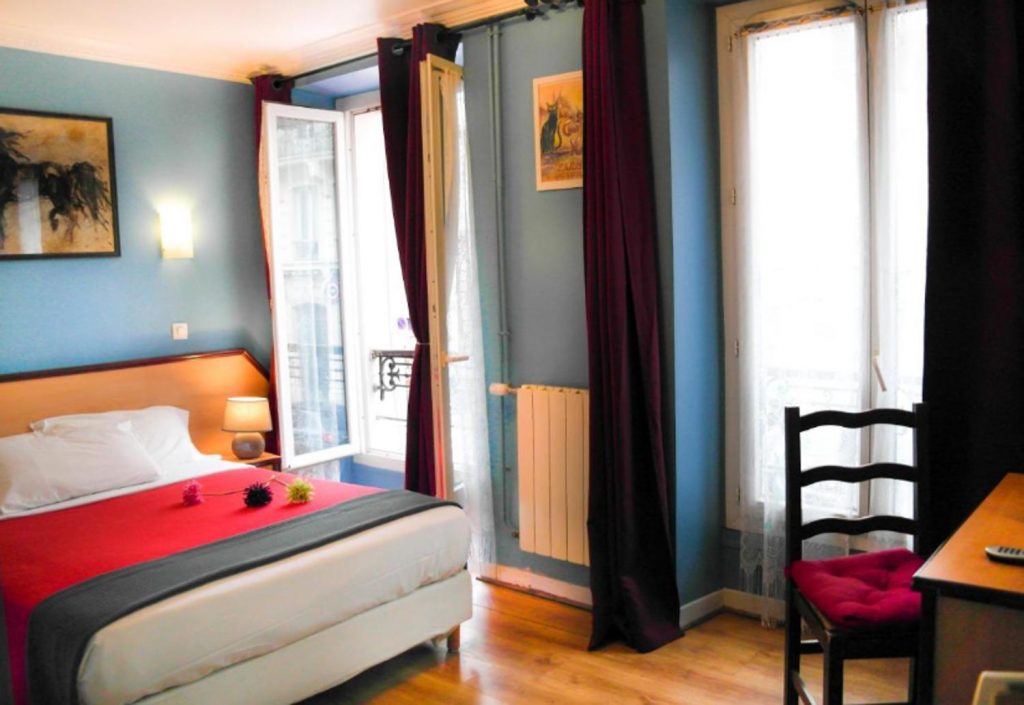
Courtesy of Hotel Audran / Booking.com
While still on the topic of booking in advance, another useful Paris travel tip is to book your accommodation in advance, especially in the summer since they book out fast.
This may not happen at all hotels/apartments but the one that suits your particular needs may be booked out if you don’t book in advance.
To help you choose the perfect hotel, I’ve written numerous articles about accommodation. You can click on the links below to go to a particular accommodation post that suits your need.
- Best Hotels with Eiffel Tower views
- Coolest Airbnbs and Apartment rentals with Eiffel Tower views
- Best Paris Hotels with Swimming Pools
- Top Hotels in Montmartre
- Budget-friendly Apartment rentals in Paris
- Best Hotels Near the Louvre museum
- Luxury Apartment vacation rentals in Paris
Alternatively, you can book my expert-selected hotels below if going through the above articles seems like a lot of work.
This is the best hotel with a view of the Eiffel Tower, this is the hotel I recommend for a luxury stay, this one for mid-range travelers, and this one for budget travelers. If you prefer an apartment rental, you’ll love everything about this aparthotel .
7. Take advantage of free museums
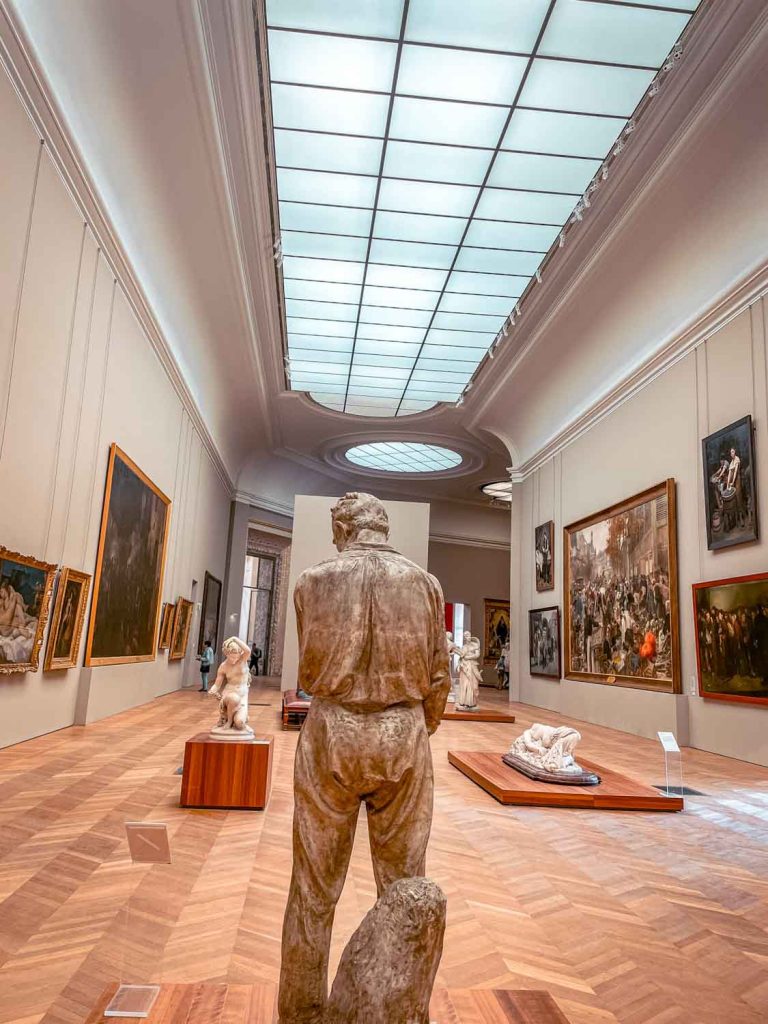
If you’re traveling on a budget or just want to save money for something else, one of the best tips for traveling in Paris is to take advantage of free museums.
There are so many free museums in Paris that are worth visiting including; Petit Palais, Musée Carnavalet, Maison De Victor Hugo, Musée De La Vie Romantique, and many others.
The best part is that since most people flock to the famous Paris museums , these ones are usually less crowded, yet interesting to visit and above all free.
8. Don’t just stick to Paris! explore the nearby cities Too

Paris is incredibly beautiful — there is no denying that! However, instead of just visiting the city and leaving the country, you should also explore nearby cities and towns.
You can plan a weekend getaway from Paris or even a day trip to places like Strasbourg, Monet’s garden, Provins, Mont Saint Michel , Chantilly, or any of these cute cities near Paris .
This will help you escape the non-stop life of Paris for a while as you enjoy the beauty of other parts of France.
9. Don’t try to see everything in a short amount of time
It’s not uncommon to want to fit in as many activities as you can in a short amount of time.
But the truth is, it’s quite impossible to see everything in one visit and quite frankly, I’ve not seen everything in Paris myself. Sometimes I find myself discovering new gems while randomly walking.
Trying to see everything will just create travel burnout since you’ll be running from one attraction to another instead of trying to immerse yourself and fully enjoy the experience.

10. Try to dress like Parisians
When it comes to what to wear in Paris, strive to dress like the locals! And how do locals dress, you may ask?
Parisians like to keep things chic and they always look like they put thought into what they’re wearing without going overboard. Not the runway kind of thing, but they always look well put together.
It’s hard to find Parisians wearing sports clothes to walk on the streets (except if they’re actively working out), or even sweatpants.
You can check out my article on what not to wear in Paris to know exactly what to leave home if you want to look like a Parisian.
11. Pack the right clothes for Each season
Before leaving the subject of clothes, another Paris travel tip to note is to pack clothes for the right season.
I have a couple of articles to help you with this depending on the season you’re visiting.
For the months of March to May, here is what to wear in Paris in springtime , what to wear in Paris in the summer if you’re traveling between June to August, what to wear in Paris in the fall if you’re visiting between August to November, and finally what to wear in Paris in the winter if your trip falls between December to February.
With those articles, you’ll know exactly the right clothes to pack for each season!
12. Go to vantage points to take in the views of the city

Paris is beautiful when seen from below but it gets even more magical from above. As you explore the city, get some time to take in the stunning views of Paris from various vantage points.
Some of the places to get stunning views of Paris include the top of the Eiffel Tower, Sacre Coeur, Ard de Triomphe, Butte Chaumont, Montparnasse Tower, Galeries Lafayette, and more. You can also enjoy the views of the Iron lady from these Eiffel Tower view spots .
13. Learning a little French goes a long way

You may hear some people say that English is widely spoken in Paris but I am here to tell you that that’s not true.
In fact, it’s more surprising to find a person who speaks English than one who doesn’t. Of course, people in the tourism industry will speak English but don’t be surprised to go to a store and no one speaks English.
This goes to say that, as you plan to visit Paris, you can learn a few basic French words to help you get around. It doesn’t have to be much but it’s always nice to try.
Some of the French words you can learn include;
- Bonjour = Hello
- Au revoir = Goodbye
- s’il vous plaît = Please
- Merci = Thank you
- De rien = you’re welcome
- Pardon = Pardon me
- Monsieur = Sir
- Madame = miss
- Une carafe d’eau, s’il Vous plaît = tap water, please
- l’addition s’il Vous plaît = The check/bill, please
- A emporter s’il vous plaît = Take away, please
- Je ne parle pas Français, désolé = sorry, I don’t speak English
- Parlez-vous anglais? = Do you speak English?
- Ou est…., s’il vous plaît? = Where is…., please?
14. Paris is not just romance and glamour

Paris is no doubt one of the most romantic places in the world. In fact, one of its nicknames is the city of love .
Yes, there are so many romantic things to do in Paris and it’s probably the number one proposal destination for couples.
But as romantic and charming as it is, it’s not just romance! It has an ugly side to it. Yes, pickpockets will try to take your stuff, scammers will try to scam you, you’ll see a few homeless people and beggars on the stress, and you be welcomed by the smell of Piss in some metro stations.
I am telling you this so that when you come, you don’t get struck by the Paris Syndrome many tourists face, especially those from Japan.
15. Check the opening hours for attractions before you visit
Another one of my favorite Paris travel tips is to check the opening hours of attractions before you visit.
Don’t just assume that all places are open at the same time or stay closed on the same days! Also, opening hours can change due to the season, so be sure to confirm before you go.
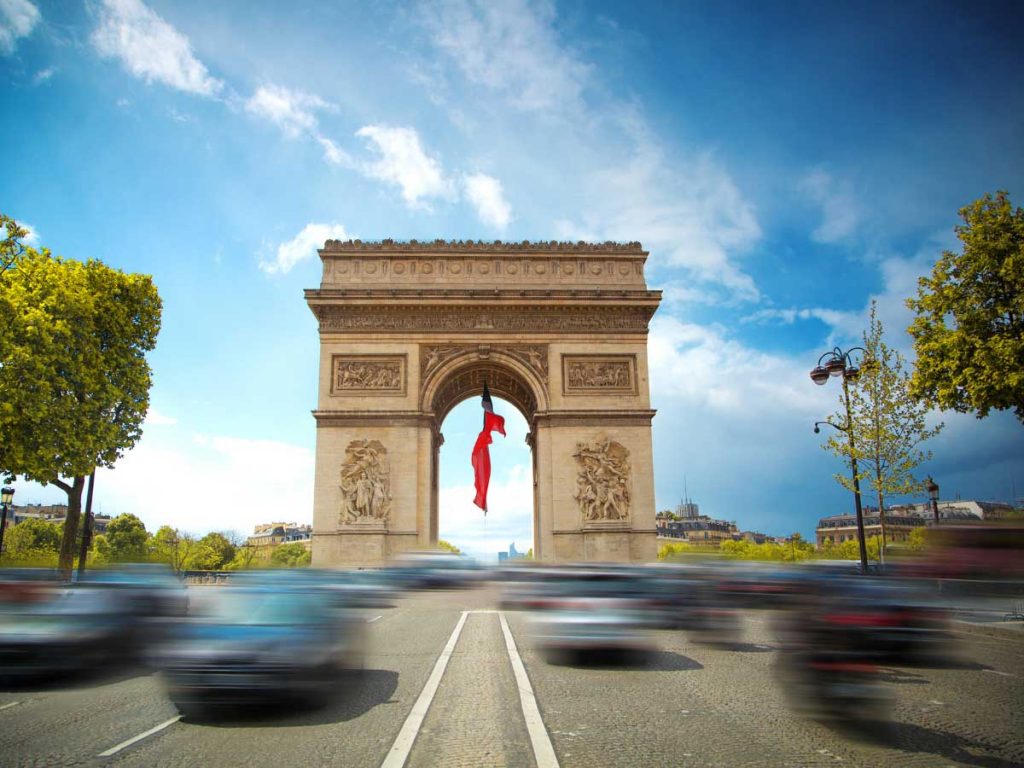
16. Create an itinerary but be open to adjusting it
Since Paris has a lot of things to see and do, the best way to see a number of them is by creating a realistic itinerary.
However, try not to follow it religiously. Leave some time in between to do spontaneous activities.
If a visit to one place leads you to another that was not on your itinerary but you’re interested in seeing it, you can just adjust your itinerary because the best experiences come unplanned — at least in some cases.
17. Most Museums in Paris close on Monday, not Sunday
It’s easy to assume that museums would be closed on Sundays but not in Paris. Most big (actually even the small ones) close on Mondays.
In fact, some restaurants too and shops close on Monday instead of Sunday. This is to make sure that people who work Monday – Friday can access certain services on Sunday.
This in turn means that people who worked on Sunday close on Monday. So, don’t just assume, check if the museum is open before your visit.

18. Explore Paris on Foot
Paris is a city best explored on foot. Most of the city’s major landmarks are not far from each other and you discover much more when you walk instead of taking the metro all the time.
For example, you could easily walk from the Opera area to Montmartre without even realizing it. While you can take the metro to reach there, you can easily walk as there are so many hidden gems to uncover along the way.
In fact, you’ll find most travelers say they walked much more in Paris than in other major European cities. This is usually common for some tourists from the US where walking is not as much as in Europe.
19. Carry Comfortable Walking shoes to Paris
If you’re a regular reader of this blog, you know that this is one thing I say all the time. Paris’s streets are covered in cobblestones and it will be hard to walk in high heels.
And if you’re going to explore the city on foot as mentioned above, you’ll want to leave your stilettoes and wedges at home and opt for comfortable walking shoes like sneakers or boots.

20. Try exploring Paris on a bike
Another way to explore Paris is to try biking. Since the world p*ndemic, Paris has put more bike lanes in place to ensure that it becomes more bike-friendly.
It’s easy to rent a bike in Paris as there are many stations all over the city where you can rent a Velib bike from without even talking to anyone.
When you’re done biking, you don’t have to take it back to where you picked it from, but rather at any other bike station you find along the way.
You can go biking along the Seine (nothing more romantic than that), along Canal Saint-Martin, and more.
21. Never forget to say bonjour when you enter a shop
While this may not be the norm back in your country, in Paris, it’s considered rude to not say Bonjour when you enter a shop.
In fact, even when you’re leaving the shop, saying goodbye is considered good manners. You can say au revoir which means “goodbye” or bonne journée for “have a good day”.
22. Carry your student id
In Paris, students are usually offered a discounted rate at major attractions, so if you’re a student, carry your valid student ID to take advantage of the reduced rates.

23. Refrain from shopping at every shop you see
Paris is a shoppers’ haven and if you’re a shopaholic, you may want to pop into every store you see to buy something.
The truth is that most shops in Paris are appealing and it’s like every single one is calling your name.
If you can resist the temptations, window shopping can do the trick, otherwise, you might just spend all your money buying luxury French brands in Paris.
24. Do not speak too loud
Another way to avoid looking like a tourist (and avoid making yourself a target by scammers and pickpockets) is by not speaking too loud.
French people in general don’t speak loud in public and always give an eye to tourists who speak like they’re addressing the entire room. Just keep the voice lower, at least until you leave Paris.

25. Explore Some of the beautiful parks in Paris
Beyond the famous landmarks, Paris is endowed with beautiful parks and gardens worth exploring. These green patches offer an escape into nature to a rather bustling city.
Whether it’s taking a leisurely walk to enjoy the cherry blossoms (if you visit in spring) or wanting to experience a Parisian picnic , there are a number of parks to choose from.
Some of the best Parisian parks not to miss include; Jardin des Plantes, Luxembourg gardens, Butte Chaumont, Parc Monceau, Tuileries gardens, Trocadero gardens, and more.
26. Plan alternative activities to do in case it rains
Regardless of the time of the year you visit whether it’s summer or winter, it’s likely to rain in Paris. But a rainy day doesn’t mean that you should just stay in your hotel room doing nothing.
There is plenty of things to do in Paris on a rainy day that you can choose from so that you don’t waste a day of sightseeing.
Plan to do activities like visiting museums or exploring the covered passages of Paris on the day it rains.

27. Be prepared for the rain
In the same way, don’t just plan out activities for a rainy day but also plan outfits and accessories for such days.
Make sure that you carry a windproof travel umbrella like this and/or this lightweight waterproof rain jacket .
28. Wake up early at least once to catch a sunrise
Imagine the sun rising above the Eiffel tower! Magical, right? If you’re in Paris for a few days, one thing you shouldn’t miss out on is taking in the beauty of the city with the first lights of the day.
You can go to any of these Paris sunrise spots and I guarantee you that compromising your sleep early in the morning will be so worth it.

29. Or stay for the sunset
If you’re not a morning person or you just prefer sunsets, ending your day with a beautiful sunset in Paris will be a memorable one.
You can go to places like Montparnasse Tower, Sacre Coeur, or the Seine cruise to watch a magical sunset.
30. Beware That Most Things close on Sunday
Like most cities, you’ll find Paris calm and quiet on Sundays. Most shops, bakeries, and even some restaurants stay closed on Sunday.
Though you’ll be able to visit some museums since they close on Monday as mentioned above, you may need to plan how to spend your Sunday well in Paris.
Tips for Paris Travel: Food & Restaurants
31. take a food tour while in paris.

Another way to fully immerse yourself in French culture is by taking a food tour. You’ll be able to not only learn more about French food but also taste it. Below are the 3 food tours I recommend in Paris.
- Le Marais Walking Food Tour: This food-guided tour will take you through the vibrant neighborhood of Le Marais. You’ll taste some wine and cheese, some pastries, and any other French delicacies that may be in during that season.
- Montmartre Cheese, Wine, and Pastry Tour: If you’d rather discover the neighborhood of Montmartre, then this is the best food tour for you. Just like the above, you’ll taste some cheese, wine, pastries, and Charcuterie. The tour is fun and informative and the guides are very friendly.
- Saint-Germain-des-Prés Pastry and Chocolate Walking Tour: If you have a sweet tooth, then this guided pastry tour is what I recommend. You’ll taste different types of chocolates, bread, and other French pastries during your tour while admiring all the beautiful bakeries in the Saint-Germain-des-Prés neighborhood.
32. Try as much French food as you can

One of the best ways to immerse yourself in the culture of the place you’re visiting is to try their local food and Paris is no different.
French cuisine is one of the best cuisines in the world and it would be a huge mistake not to try as much as you can.
Some of the French foods you can try include; Raclette (if you visit in the colder months), Crêpes, Croque Monsieur & Croque Madame, or Jambon-Beurre but don’t be afraid to try traditional French foods too like Escagorts, Frog Legs, or Couilles De Mouton (Mutton Testicles).
33. Don’t eat near famous attractions unless you have the budget for it
Unless you have the budget for it, I would refrain from eating at restaurants near popular places.
They’re usually expensive yet just a few minutes away you could get the same exact things (or even better) for less.

34. Make reservations at restaurants ahead of time
Just like at attractions, you’ll need to make reservations at restaurants, especially fancy ones like these restaurants with a view of the Eiffel Tower .
While you can just arrive at smaller cafes and bistros, some restaurants require making a reservation. You can’t just walk in and expect to be seated.
For some, you can make a reservation that very day while others require making a reservation up to 3 months in advance as they book out fast.
One example is Jules Verne , a restaurant at the Eiffel Tower. It’s almost impossible to find availability if you book 1 week or 2 in advance, even a month would be late. Try 2 or 3 months in advance to reserve a table.
So, before you go to Paris, make sure you make reservations if you plan to eat at such restaurants.
35. There is no need to tip At Parisian Restaurants (though appreciated)
While tipping is a big deal in most countries, it’s not the case in Paris. In Paris, the service fee is usually included in the overall price of the meal at restaurants, so don’t feel compelled to tip.
On the other hand, if the service you received was phenomenal and you want to tip your server, you can ask them to include an amount you want to tip to your bill but the best option is to leave a cash tip.

36. Drink tap water instead of buying bottled one
Water in Paris is safe to drink! Locals drink it and you too can. So, instead of wasting money on bottled water, you can just drink tap water from your hotel room.
In fact, even if you’re out exploring, you can still access tap water from the many water fountains (known as Wallace fountains) dotted around the city. Some even have sparkling water if that’s what you prefer.
These fountains are hard to miss as some are historically built but for ease of access, you can check this page for the exact locations in each arrondissement.
Just make sure to carry a reusable travel water bottle like this so that you refill it every time it runs dry.
This won’t only save you money but it’s also great for the environment as it reduces plastic usage.
37. Request for Tap Water at Restaurants too
While still on the topic of water, ask for tap water at restaurants. Most Parisian cafes and restaurants have made it a habit to always put a bottle of tap water on every table.
However, if the restaurant you go to doesn’t do it automatically, feel free to ask for tap water and it will be offered to you for free.
Travel tips for Paris Transporation
38. the metro is the best way to get around.

Paris’s metro system is very well connected and it’s easy to get around no matter where you are. It’s easy to use, you won’t be stuck in traffic, and it’s also the cheapest form of transportation in Paris.
The other options are buses, trams, taxis, or Uber. The downside with buses is getting stuck in traffic and the same applies to taxis/Uber except that the latter is a bit more expensive compared to buses or the metro and the train.
39. Renting A Car In Paris Is A Bad Idea
One of the things to know before traveling to Paris is that renting a car is a very bad idea.
As I mentioned above, public transportation in the city is very effective and cheap compared to hiring a car.
Renting a car will mean being stuck in traffic most time and you’ll have to deal with the crazy Parisian drivers, plus, it’s very expensive. So, save yourself from that pain but choosing not to hire a car. It’s really not needed!
40. Buy A Carnet Of Metro Tickets Instead Of One Every Time
If you plan to ride the metro a number of times (this is inevitable if you’re spending more than 3 days in the city), you’ll be better off buying a carnet of metro tickets.
A carnet is a bundle of 10 tickets and it’s cheaper than buying 10 individual tickets. It will also save you time instead of going to a ticket machine every time you need a new ticket.

41. Don’t Throw Away Your Metro/Train Ticket Just Yet
While still on the topic of tickets, one of the important Paris tips and tricks is to not trash your metro ticket before you fully exit the station at the end of your trip.
If the ticket control team finds you without a ticket, chances are high that you’ll be fined — which is 10 times more than the ticket price.
Plus, the ticket will help you exit the metro/train station. Without it, you may need to buy another one just to exit.
42. Beware of the metro working hours before going out to party late at night
Paris nightlife is fun and vibrant and you should enjoy it at least once. But as you plan to go out, be mindful of the metro working hours.
Is there a metro running on the line you take to go to your hotel (check if there are ongoing strikes)?
What time do they stop working on the day you want to go out? Check all this ahead and plan when to go back if you want to use the metro. Check the Ratp website to stay updated on the metro working hours.
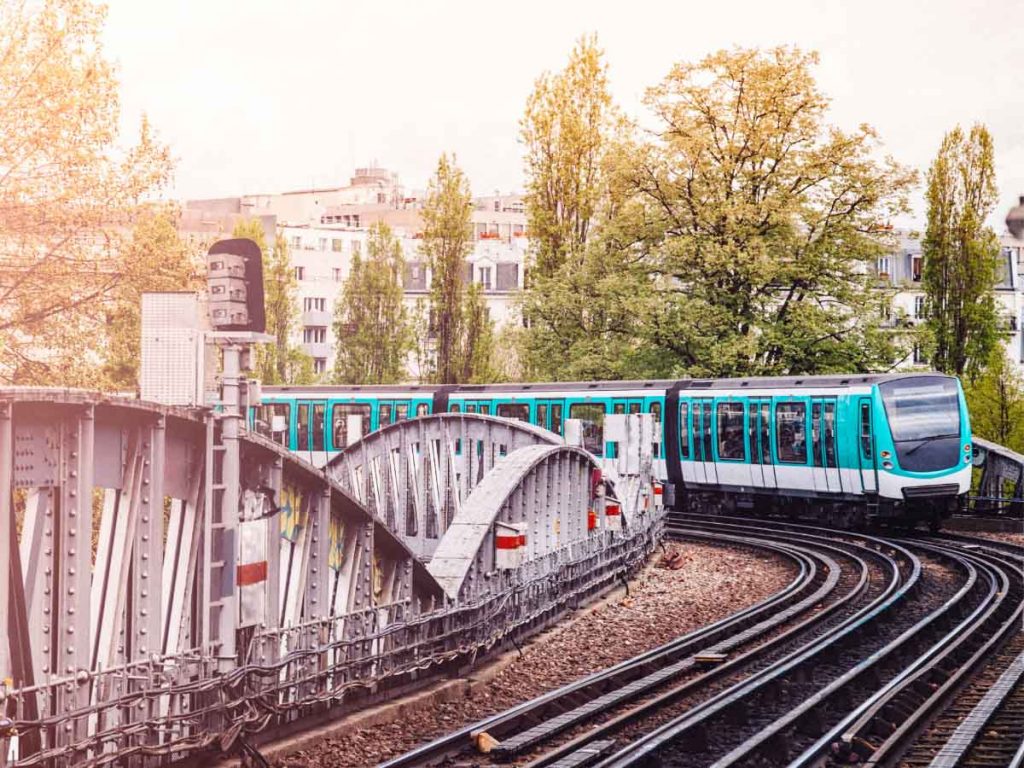
43. You can also download the Bonjour RATP app
Besides just checking the website, you can download the Ratp app to stay updated on all the public transportation in Paris.
With the Bonjour RATP app , you’ll know when a metro line is closed, where to take the metro from, find the closest bus line, Velib stations, RER, the night bus, and more.
Think of it as a one-stop shop for all public transportation around Paris.
44. Avoid taking the metro during rush hours (if possible)
The metro can be something during rush hour, usually between 8 AM to 9 AM and then from 6 PM to 7:30 PM. They’re heavily packed and everyone seems to be in a rush for some reason.
As a tourist, it may not be the best moment to take the metro, especially if you can avoid it.
To give you a rough picture, you may not get where to seat, people will be pushing you (it will be person to person), and on some lines, you may not even be able to get onto the metro because it’s just too packed.
So, if you can avoid taking the metro during rush hours, do it.

45. Make city mapper your friend
One of the best apps to use in Paris is city mapper. I use it all the time for literally anything.
Besides the usual direction which I find more accurate than google maps sometimes, they give metro and train live updates.
You just type in where you want to go and it will show you the best metro/train to take, where to stop, which exist to take, and the best car on the metro/train to sit in.
Though google maps can do some of this, I find Citymapper much more accurate every time!
Money Tips for Traveling in Paris
46. you don’t have to spend a lot in paris.
Paris is ranked as one of the most expensive cities to visit! And while that is true, it doesn’t mean that people traveling on a budget can’t make it work at all.
There are so many free things to do in Paris that will save a couple of bucks, like visiting free museums as we talked about earlier.
You can also sign up for free walking tours and instead of eating out every day, make your own meals if you booked an apartment rental with a kitchen.

47. Cards a widely accepted but some places have a minimum amount they accept
One of the other Paris tourist tips you should know is that cards are widely accepted in most places. However, some places, usually small bars, bakeries, and some shops require a minimum amount to be able to pay by card.
It can be anywhere from a minimum spend of 3€ to 6€. For anything below that, you’d be required to pay by cash.
Actually, at times you’ll come across places that don’t accept cards at all. So, as you visit Paris, try to always carry some cash with you however little it may be.
48. Always carry a few coins for public toilets
Paris is one of those cities where you have to pay to access public toilets, so carry a few coins, (usually 1 Euro) for La Dame Pipi or the lady seated near the toilet collecting money.
However, in some public toilets, credit/debit cards work, so you can use the no-contact payment with ease.
Safety Travel Tips in Paris
49. look out for paris travel scams.

Unfortunately, scams are very rampant in Paris, especially in the areas near the Eiffel Tower and other crowded places.
As you explore, be vigilant and aware of your surroundings. Some of the scams to look out for include;
Someone coming to you with some written documents and asking you to sign and support their cause.
Don’t fall for this because as soon as you sign, they’ll demand money aggressively and since you may want to get out of that uncomfortable situation pretty soon, you will be tempted to just give them money and leave.
If anyone (usually women) comes to you with stuff like this, just say No, thanks, and move on.
Another scam is the friendship bracelet scam . This one usually happens around Sacre Coeur with someone coming towards you in a friendly way with a bracelet. They’ll try to put it on your wrist and then force you to pay for you. Just move away from anyone trying to be friendly with a bracelet.
50. Be Aware Of Pickpockets
Unfortunately, this is one of the vices that seem to never go away in Paris. Pickpockets are usually in crowded places, in the metro and also the subway.
The only way to avoid them is to carry your bag in the front and be mindful of your surroundings all the time.
Pickpockets also usually target tourists as tourists are less opposed to following up on the crime, so try not to look like a tourist, especially in sketchy places.
Final Thoughts on the Best Paris Travel Tips
It’s easy to miss or overlook some things when going to the French capital, but with these tips for traveling to Paris, I hope you’ll have a great time and know exactly what and what not to do in Paris .
Whether it’s avoiding scams, deciding when to go, or even how to navigate the city, these travel tips for Paris will come in handy.
NEVER TRAVEL TO PARIS WITHOUT TRAVEL INSURANCE One of the biggest mistakes you’ll ever make when planning a trip to Paris is to forego Travel Insurance ! You might think that it’s expensive, but when you think of how much it will save you when you lose your valuables or even get sick, then you’ll know that it’s NOT that expensive! Unfortunately, things can and do go wrong when you travel. World Nomads offers coverage for more than 150 activities as well as emergency medical, lost luggage, trip cancellation, and more. If you’re considering travel insurance for your trip, check out World Nomads .
Check out these posts to help you plan your trip to Paris
- Fun things to do in Paris on a Rainy day
- Famous Paintings in Paris
- Where to Find the Best Macarons in Paris
- Famous Paintings at the Louvre Museum
- Best Covered Passages of Paris
- Most beautiful neighborhoods of Paris
- Fun free things to do in Paris
- Famous Churches to Visit in Paris
- Best Museums in Paris
- Tips for Visiting the Eiffel Tower
- How to spend One day In Paris
Was this post on how to travel in Paris helpful? Then please consider sharing it with others.
Sharing is caring!
Esther is the face and voice behind Dreams in Paris! She has always been obsessed with Paris even before she moved there. She has lived in Paris for a couple of years, and that obsession has not changed! That love for Paris, plus her passion for writing led to the birth of Dreams in Paris! She now shares all the practical tips and guides she’s picked along the way to help you plan a memorable trip to the city of love! You can learn more about her here !
Similar Posts

How to Plan The Perfect Picnic in Paris
Want to go on a Parisian picnic but not sure how to plan one? This post will give you simple steps to planning the perfect picnic in Paris. A picnic in Paris! It has always been on my long list…

Luxembourg Gardens in Paris: 14 Things To Do (+ History & Practical Tips)
Planning to visit the Luxembourg Gardens in Paris? This article will show you everything you need to know from its history and what to do to practical tips! Nestled in the heart of Paris’s Left Bank between the Latin Quarter…

Paris Skip the Lines: 6 Best Ways to Skip The Lines in Paris And Not Waste Time
Looking for ways to skip the lines in Paris? Keep reading and you’ll know how to beat the long queues in Paris! Paris is such a popular destination with iconic landmarks that are on almost everyone’s travel bucket list! With…

Paris first time visitors: Tips for Visiting Paris for the first time
Traveling to Paris for the first time? Here is the complete guide to visiting Paris for the first time with everything you need to know. That’s it, the decision is made, you’re going to visit Paris! First of all, congratulations…

Rue De L’Abreuvoir In Montmartre (+ History And What To Do)
Want to learn more about Rue de l’Abreuvoir in Montmartre? This article will give you everything you need from its history, what to do, to how to get there! Rue de l’Abreuvoir is a famous street in the Montmartre neighborhood…
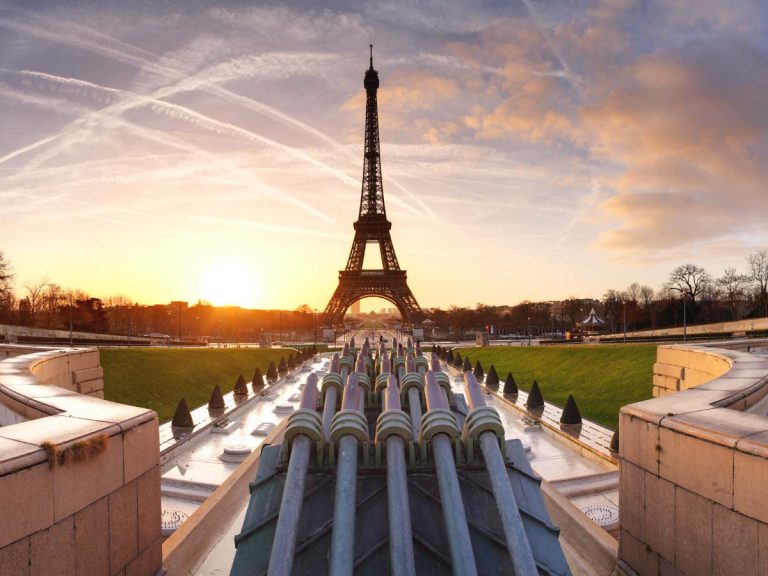
A Complete Guide To The 20 Arrondissements Of Paris (+ What to Do in Each District)
Here is a complete guide to the arrondissements of Paris to help you get a deeper understanding of what they are and what each entails! Organized in a snail shell spiral, the iconic city of Paris is divided into several…
Leave a Reply Cancel reply
Your email address will not be published. Required fields are marked *
Save my name, email, and website in this browser for the next time I comment.
This site uses Akismet to reduce spam. Learn how your comment data is processed .

What Does Eiffel Tower Mean In Slang & How To Use It
What does eiffel tower mean in text, tiktok and social platforms, a sexual position between three people.
The Eiffel Tower is a common slang term used to refer to a sexual position involving three people, typically involving one person being the “base” for the other two to engage in sexual activity. It is not a commonly used term and is considered vulgar.
In terms of responding to someone who uses this term, it is best to avoid using it yourself and instead steer the conversation in a different direction or simply not engage with the person using this term.
Friend 1: “Hey, have you ever heard of the Eiffel Tower?” Friend 2: “I’d rather not talk about that. Can we change the subject?”
In this example, Friend 2 is uncomfortable with the topic and politely suggests changing the subject.
Man: “I saw a video on TikTok of the Eiffel Tower and it looked so hot.” Woman: “I don’t want to hear about that kind of thing, it’s disrespectful”
In this example, the woman expresses her discomfort and disapproval of the man’s comment and wants to change the subject.
What does Eiffel Tower mean from a guy
The phrase “Eiffel Tower” is a slang term that refers to a sexual act involving three people, typically a woman in the middle with a man engaging in anal sex while another man performs oral sex on her at the same time. It is not appropriate to use in a polite conversation. It is impossible for me to know whether the guy likes or hates you, trying to make a move or not, based on this term. You should respond in a way that makes you comfortable and according to the context of the situation.
Girl: “Hey, did you hear about the new club opening up next month?” Guy: “Nah, I haven’t. But I did hear about the Eiffel Tower. Have you tried it yet?” Girl: “Excuse me? That’s not something I want to talk about.”
In this example, the guy is trying to steer the conversation towards a sexual topic and the girl is uncomfortable with it.
Girl: “I can’t believe we’re going to Paris next week!” Guy: “I know, me too. I can’t wait to see the Eiffel Tower.” Girl: “Me too! It’s always been on my bucket list.”
In this example, the two are talking about their excitement for the upcoming trip to Paris and the Eiffel Tower is being used in its literal sense.
What does Eiffel Tower mean from a girl
The term “Eiffel Tower” is a slang term that refers to a sexual position involving three people, typically a man and two women. It is not something that would typically be discussed or referred to by a girl in a casual conversation and could indicate that she is comfortable discussing sexual topics or may be trying to make a move. It is difficult to say whether she likes or hates feelings for you based on this one phrase. It would be best to observe her overall behavior and actions towards you to gauge her feelings.
Girl: “Hey, have you ever heard of the Eiffel Tower?” Guy: “Yeah, I have. It’s a sexual position involving three people, right?” Girl: “Yeah, exactly. My friends and I were talking about trying it out sometime. Would you be interested?”
In this example, the girl is making a move and expressing interest in engaging in the Eiffel Tower sexual position with the guy and potentially others.
Girl: “I can’t believe they named a sex position after the Eiffel Tower. That’s just disrespectful.” Guy: “I know what you mean. It’s pretty crass.” Girl: “I just think it’s tasteless to use such a romantic and iconic landmark in that way.”
In this example, the girl is expressing her dislike for the term “Eiffel Tower” being used in reference to a sexual position and finds it disrespectful to the landmark.
You may also like
Top 33 slang for range – meaning & usage.

IMAGES
VIDEO
COMMENTS
A sentence used when you are implying that you want to use a sex position called the Eiffel Tower.
Similar to "Chick" and "Dude" in English, "Meuf" and "Mec" are slang words used to describe a girl and boy. "Meuf" being feminine and "Mec" being masculine. People also refer to their girlfriend or boyfriend using these slang words, for instance, "Mon mec" and "Ma meuf". However, some people use these slang words ...
4. Bjr - Hello. There are so many different ways to say hello in French, and here is another one. Bjr which is short for " bonjour ", meaning "hello". 5. Bsr - Goodbye. And for goodbyes in French, there is bsr which is short for " bonsoir ", meaning "goodbye". 6. A+ - Later.
It's great Paris slang to use if you are in the centre of the tourist spots in Paris! Example: Cette annonce est une arnaque. (This advertisement is a scam.) 13. Sans Déc. Sans déc means "no kidding", "no way" or "get out of here!" The French slang translation is far stronger than in English though. It's short for sans ...
Common French Sayings and French Slang. Hello: Salut (informal) I love Paris: J'adore Paris. Have a nice trip: Bon voyage. Forget it or drop it: Laisse tomber. Come on or let's go: Allez. That's ...
Merci beaucoup - "Thanks a lot". And of course, don't forget to say thank you! The French word for "thank you" is merci. Or you can make it stronger by saying merci beaucoup - "thanks very much". Use merci in all the same situations you'd say "thank you" in English.
Greetings and general phrases. There is quite a lot of different French greetings but the most basic is the Bonjour. If there is only one word to remember on your trip, this is the one. French phrases. English translation. Bonjour. Good day, Hello. Salut. Hi, hello, goodbye.
T'es large. If someone drops this into conversation, don't worry, they don't mean you should lay off the crêpes…. In a figurative sense, t'es large means that you've got plenty of time in which to do something. Je devrais partir vers 17h pour le concert à 19h. I have to leave at 5pm to make the concert for 7pm.
In France, politeness is not just a gesture—it's a way of life. By understanding and using basic French phrases for travel, such as "S'il vous plaît" and "Merci," you can navigate social interactions with grace. Embrace the cultural nuances of courtesy that enrich every conversation. French Phrase. English Translation. Merci.
Here are the key greetings to know and when to use them: Bonjour (bohn-jour)- Hello: Directly translating to "good day", this word is one of the most imperative to use in nearly any situation in Paris. Doormen, shop workers, waiters, even the people you might pass in the hallway of your Paris Perfect apartment building will greet you with ...
Bonne soirée. Just like bonne journée means "have a good day" and is used when exiting, bonne soirée means "have a good evening" and is used in the same fashion. Here is how to pronounce it: Note: For some reason a lot of non-French speakers will say "bonne nuit" in this situation, which is incorrect. You would never say bonne ...
Bonjour - Hello. The phrase bonjour is the most common and widely used greeting in French. It sets a positive tone for your conversation. You can use this greeting all day. Bonsoir - Good evening. Bonne soirée - Have a good evening. Bonsoir is used in the evenings, from around 6 pm onward as a greeting.
Kiffer is another way of expressing that you like something, in a much less formal way. Using this would be like saying that you 'dig' something. Occasionally replacing aimer with kiffer will be sure to make you sound like a local among young people. «Je kiffe ton style.».
The perfect greeting. Even if you can't carry on the conversation in French, it's always best to start it off the right way. Meaning, it's a smart idea to start any dialogue — with a shop owner, tour guide, passerby, you name it — with Bonjour. S'il vous plaît…. (Hello, please…). This simple phrase is useful when asking for ...
These are Amazon's best-selling travel products that you may need for coming to Paris. Bookstore. The best travel book : Rick Steves - Paris 2023 - Learn more here; Fodor's Paris 2024 - Learn more here; Travel Gear. Venture Pal Lightweight Backpack - Learn more here; Samsonite Winfield 2 28″ Luggage - Learn more here
According to Google Translate, if you want a coffee with milk you should ask for a "café au lait". Seems reasonable, but for some reason asking for this will sometimes get you a large bowl of milky coffee and an exorbitantly high check to boot. Once again, the magic words you need to signal to the waiter that you know your French is ...
29 Basic French Travel Phrases For Directions: Beautiful French Language. Getting lost in a new city or country is a thing that most people can relate to. I remember my first trip to Paris. I was so engrossed in exploring the architectural beauty around me that I got separated from my travel group. I freaked out and was on the verge of crying.
The official language of France is French, of course. However, you'll find that a number of other languages are spoken throughout the city. According to a 2013 study, these are the most common languages spoken in Paris: - French: 82.2%. - Arabic: 2.4%.
A traveler might say, "I roamed the streets of Paris, soaking in the atmosphere." Someone planning a road trip might suggest, "Let's roam the countryside and see where we end up." 10. Hike. A hike refers to a long, vigorous walk, typically taken in natural or scenic areas such as mountains, forests, or trails.
1. Hit the road. This phrase is used to indicate the beginning of a trip or adventure. It can be used both literally and figuratively. For example, "We packed up the car and hit the road for our cross-country road trip.". Someone might say, "I've been stuck at home for too long, it's time to hit the road and explore.".
4. Buy skip-the-line tickets in advance to avoid wasting time in queues. Louvre museum queues. One of the most useful tips when visiting Paris is to buy skip-the-line entry tickets to attractions in advance. Paris is one of the most visited cities in Europe, so you can expect long queues at its popular attractions.
In this example, the two are talking about their excitement for the upcoming trip to Paris and the Eiffel Tower is being used in its literal sense. What does Eiffel Tower mean from a girl. The term "Eiffel Tower" is a slang term that refers to a sexual position involving three people, typically a man and two women.